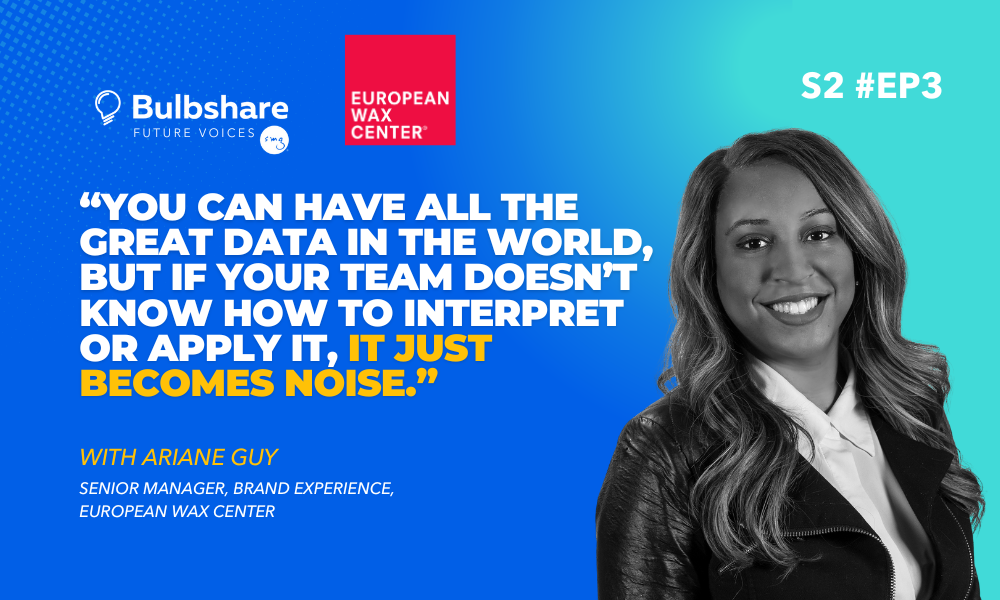






A year of shared successes!
Together, we’ve built communities, collaborated and co-created, and brought impact. Let’s take a look back at all we accomplished together!

Community is at the core of Bulbshare.
The communities we brought together are dynamic, diverse groups of people who are passionate to share insights, ideas, and experiences that shape the future.
Our communities thrive on collaboration, co-creating meaningful solutions, provide authentic feedback, and driving innovation.
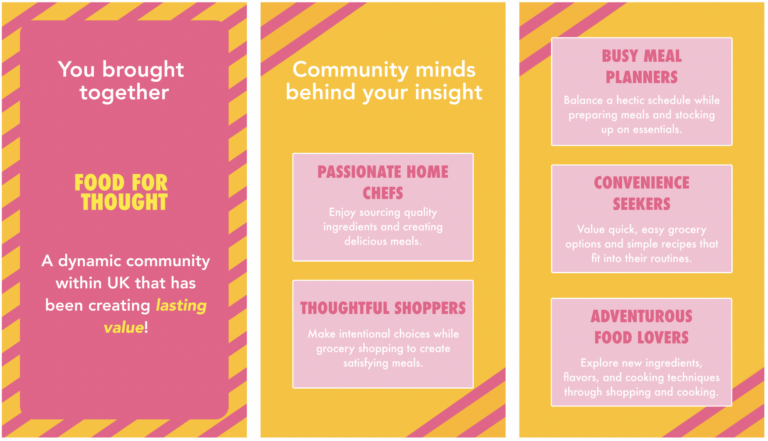
By amplifying real voices, you created a powerful sense of empowerment and mutual impact. YOU were at the heart of it all!
Let’s take a moment to reflect on how, TOGETHER, we made it happen.
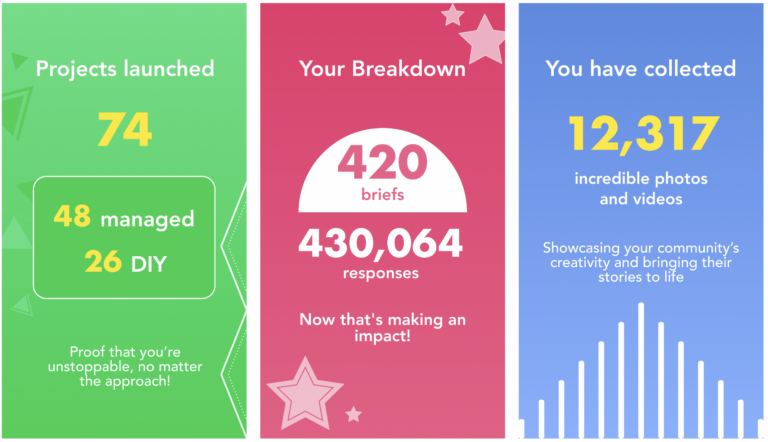

Did you know….
How many of our question types have you tried? And which ones does your community love the most? Dive in to find out!
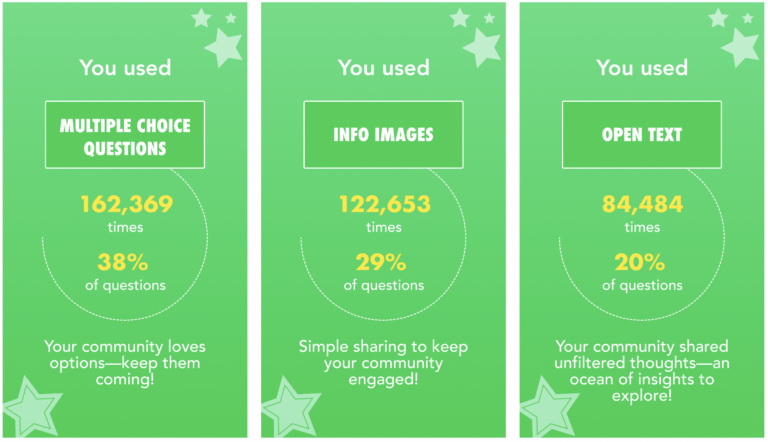

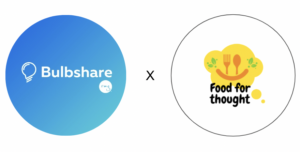
A year of shared successes!
Together, we’ve collaborated, co-created, and delivered meaningful impact. Let’s take a look back at everything we accomplished this year!

Collaboration is at the core of Bulbshare.
This year, we worked with dynamic and diverse groups of people who shared insights, ideas, and experiences that shaped the future.
By amplifying real voices, you created a powerful sense of empowerment and impact. YOU were at the heart of it all!
Let’s take a moment to reflect on how, TOGETHER, we made it happen.
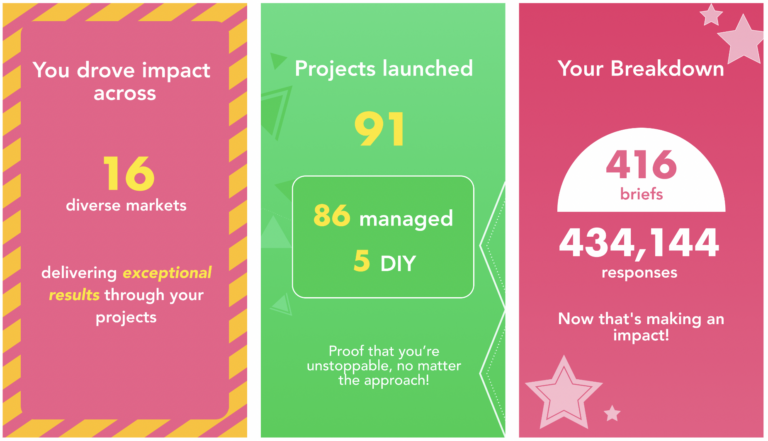

Did you know….
How many of our question types have you tried? And which ones resonate the most with your audience? Dive in to find out!
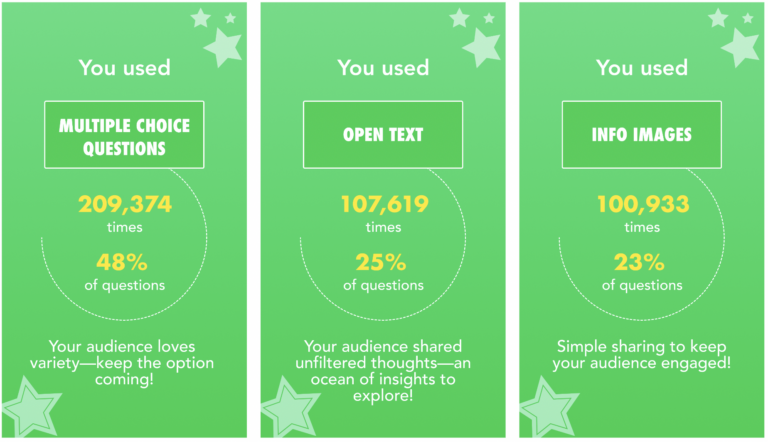


A year of shared successes!
Together, we’ve built communities, collaborated and co-created, and brought impact. Let’s take a look back at all we accomplished together!

Community is at the core of Bulbshare.
The communities we brought together are dynamic, diverse groups of people who are passionate to share insights, ideas, and experiences that shape the future.
Our communities thrive on collaboration, co-creating meaningful solutions, provide authentic feedback, and driving innovation.
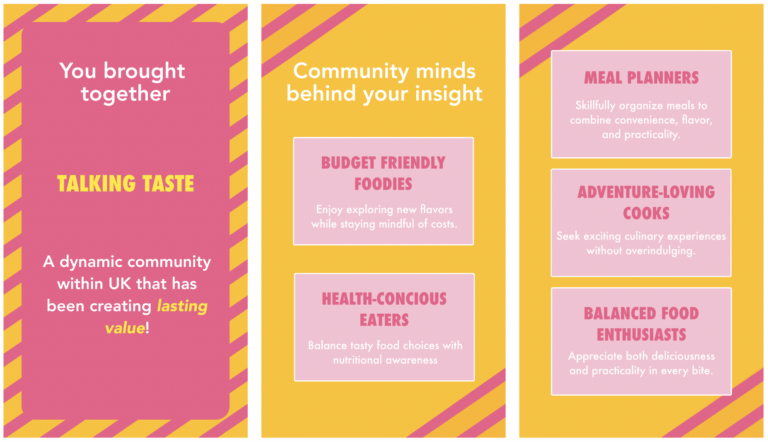
By amplifying real voices, you created a powerful sense of empowerment and mutual impact. YOU were at the heart of it all!
Let’s take a moment to reflect on how, TOGETHER, we made it happen.
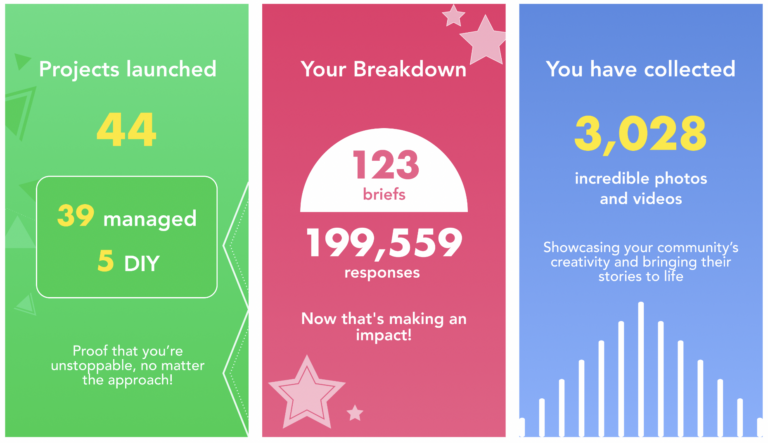

Did you know….
How many of our question types have you tried? And which ones does your community love the most? Dive in to find out!
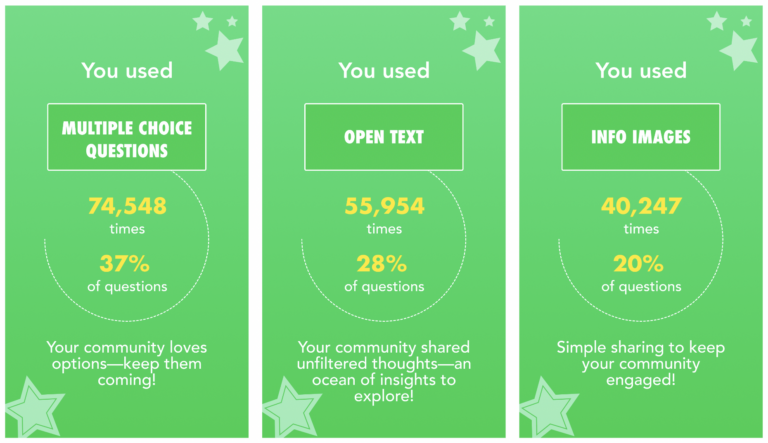
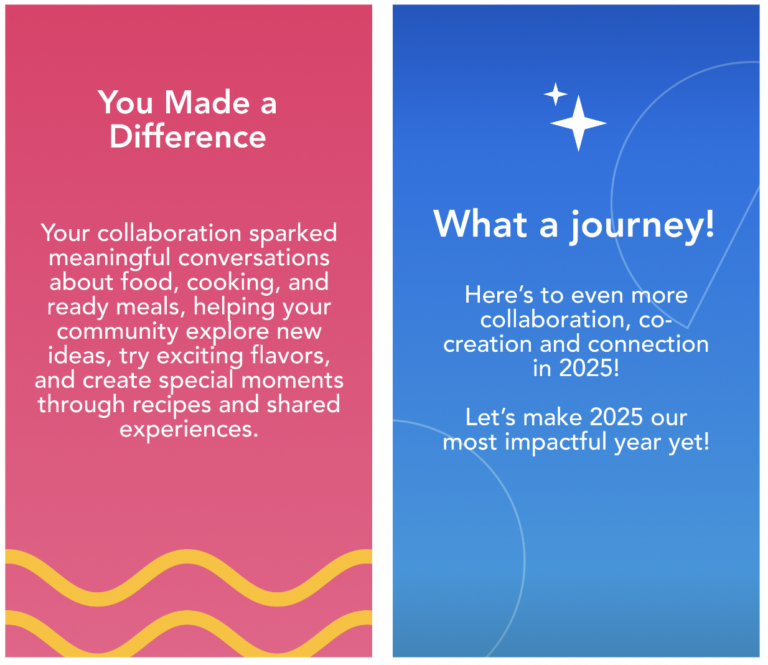

A year of shared successes!
Together, we’ve built communities, collaborated and co-created, and brought impact. Let’s take a look back at all we accomplished together!

Community is at the core of Bulbshare.
The communities we brought together are dynamic, diverse groups of people who are passionate to share insights, ideas, and experiences that shape the future.
Our communities thrive on collaboration, co-creating meaningful solutions, provide authentic feedback, and driving innovation.
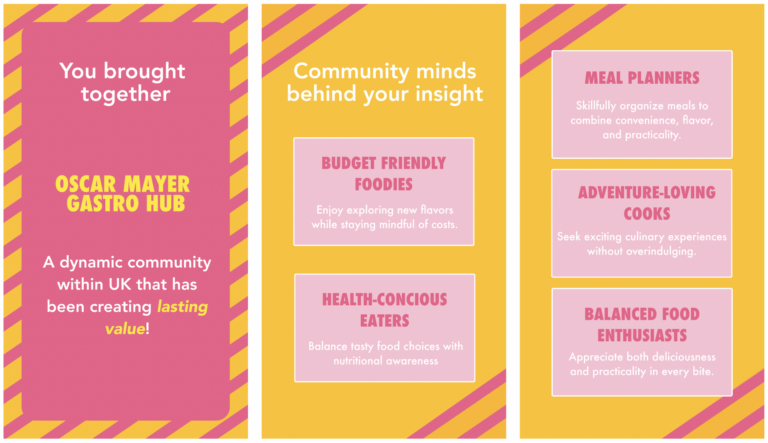
By amplifying real voices, you created a powerful sense of empowerment and mutual impact. YOU were at the heart of it all!
Let’s take a moment to reflect on how, TOGETHER, we made it happen.
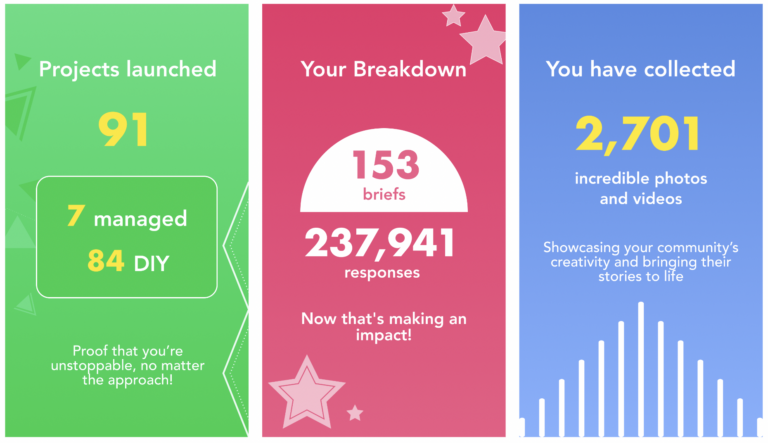

Did you know….
How many of our question types have you tried? And which ones does your community love the most? Dive in to find out!
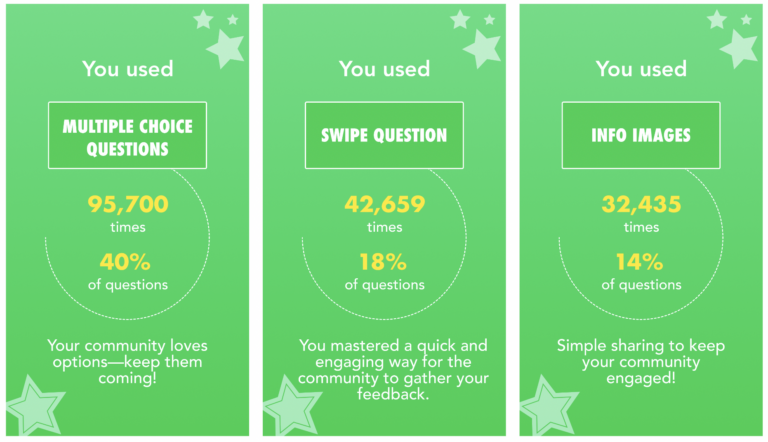
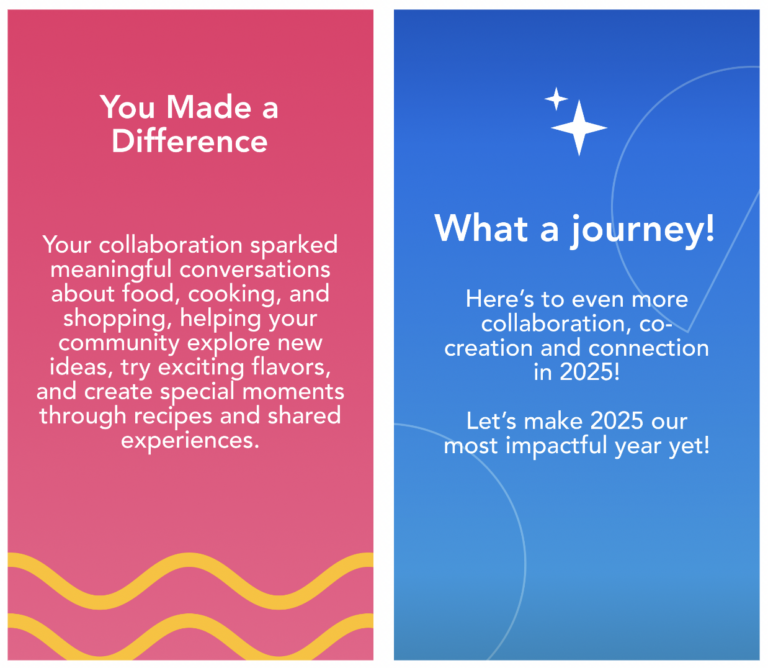

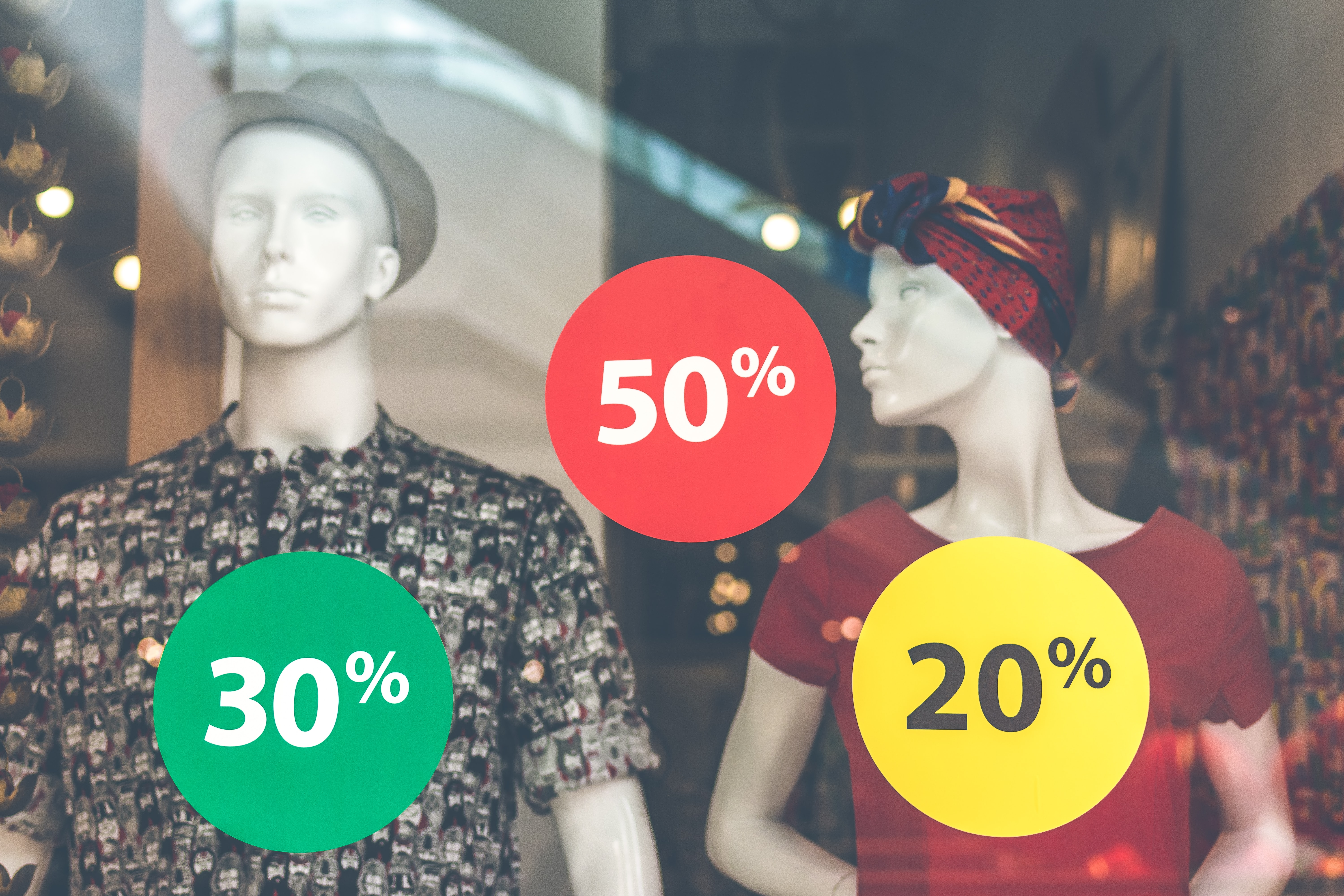
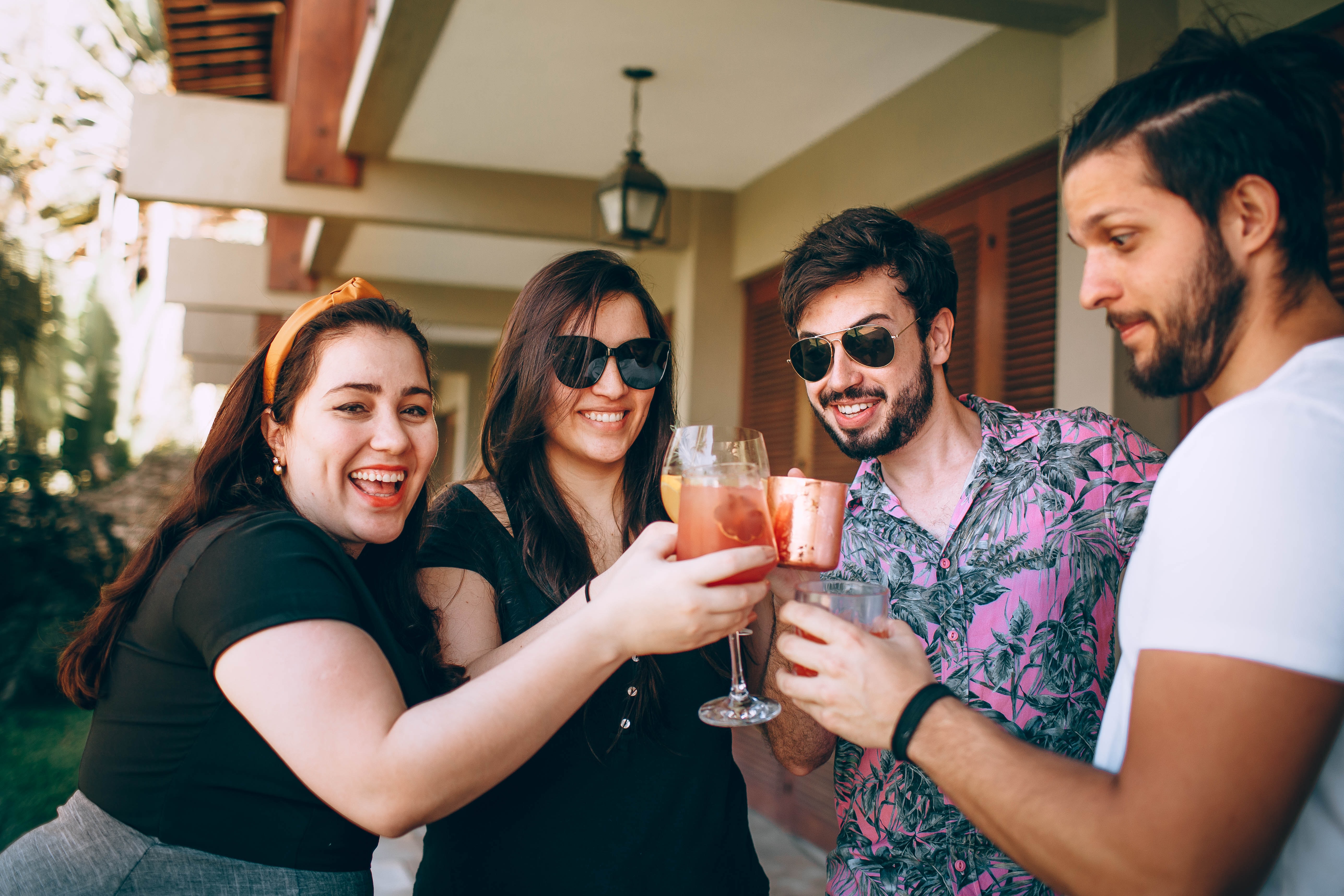
With the UK tentatively reopening next week, we asked our community how they felt about heading back out for a pint! On the cusp of so much change, we wanted to know whether they feel cautious about going out for the first time in so long or are rearing to go…
It’s safe to say, our community were excited to be back out, with a beer in hand!
Check out the infographic to discover what our UK market research communities had to say about drinking and dining this summer.
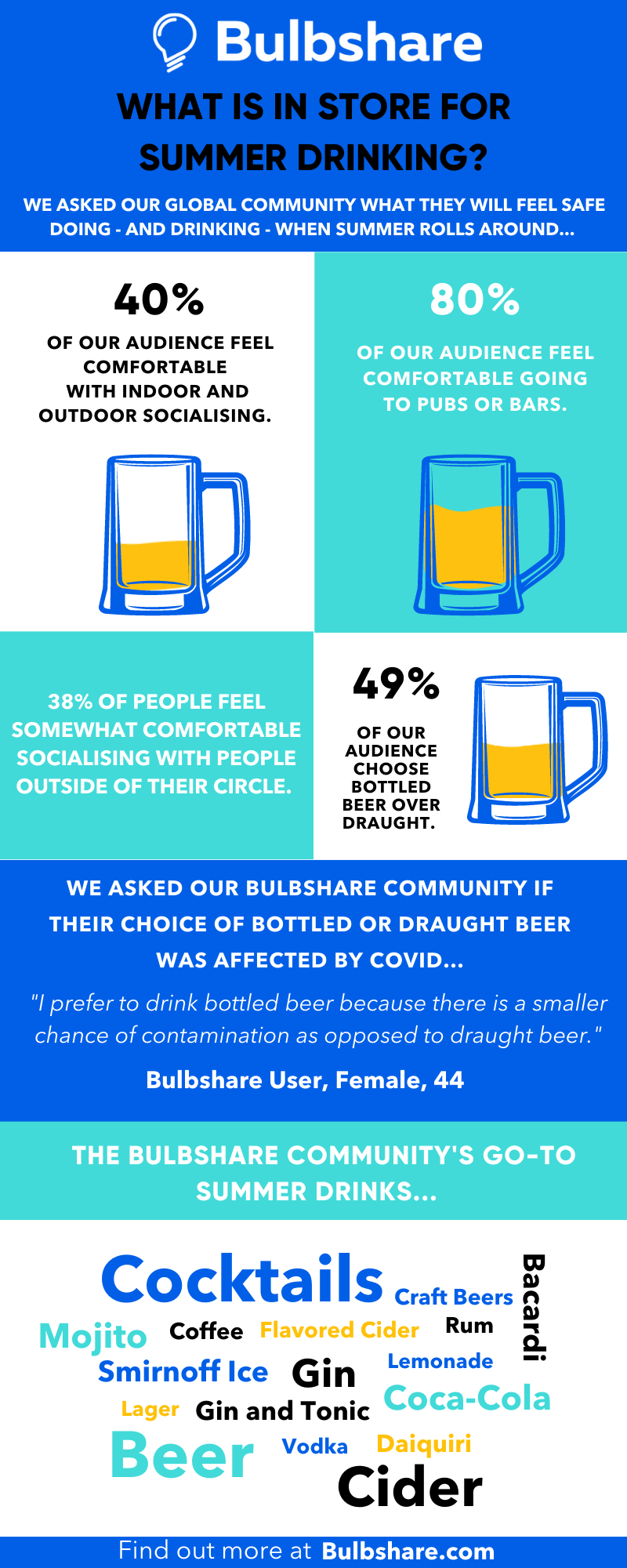
“I am excited to have more freedom to enjoy time with family and friends again” – Bulbshare user, Female, 55, UK
80% feel comfortable going to BBQs and picnics, 63% are heading back to bars and pubs and 78% are going to beer gardens. It’s safe to say the hospitality industry will have a lot on their plates this summer; seats will be full in pubs, restaurants and bars for the first time in months.
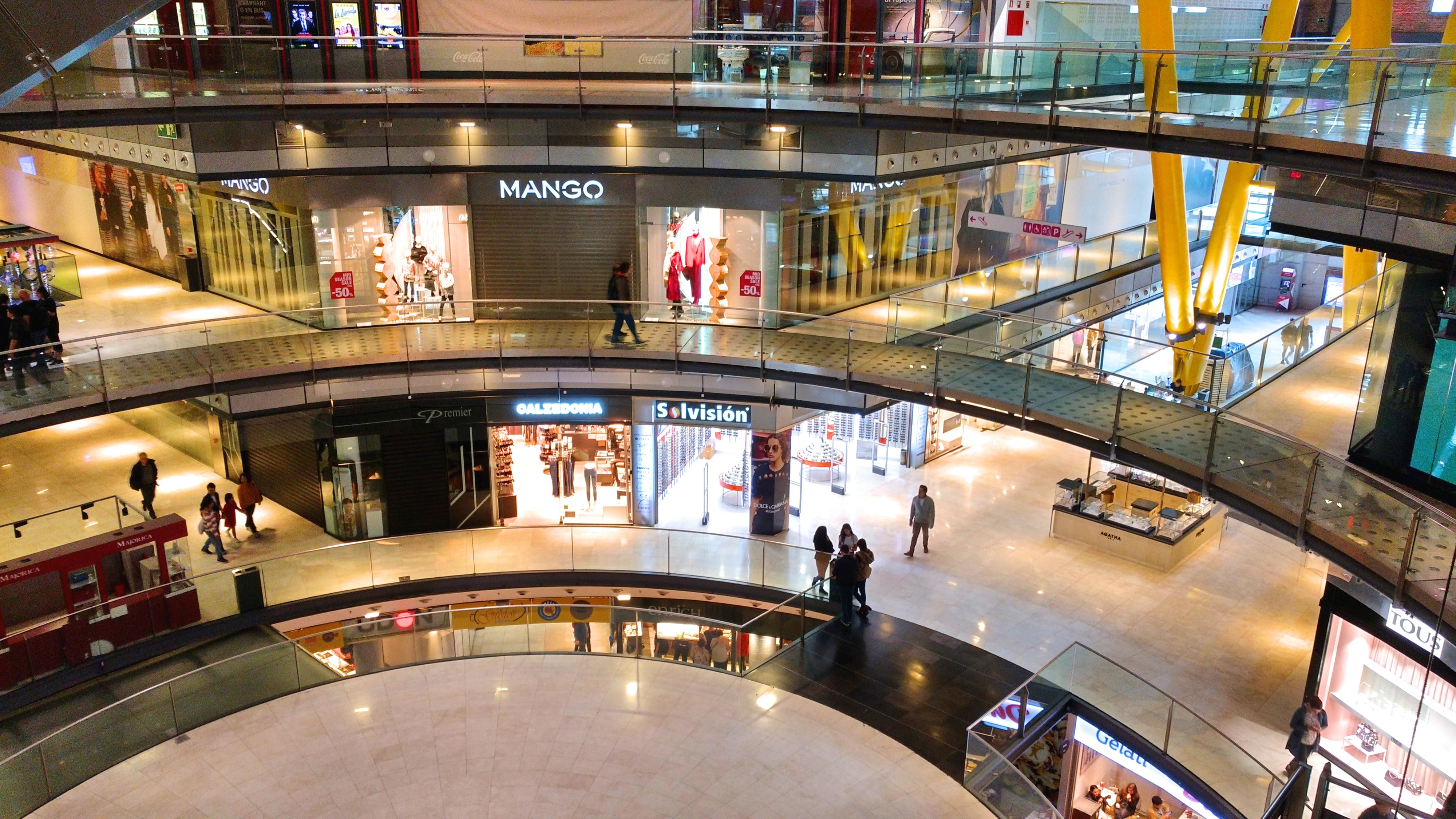
The key consumer shopping trends post lockdown and what they mean for retail, brands and shopping centres.
How will our idea of the high street and shopping centres evolve over the next 12 to 18 months? What does it mean for brands and what are the retail trends set to shape the future?
Join us for an hour of insights as we look at the key consumer shopping trends post lockdown, examine the impacts for brands and offer expert guidance on how to react.
Featuring an industry expert panel:
– David O’Shea: Director, Time Retail Partners
– Louise Hughes: Collaboration Director, Bulbshare / Ex Retail Strategy Expert, Boots, RB, AB InBev
Request our webinar recording now to unlock all the insights…
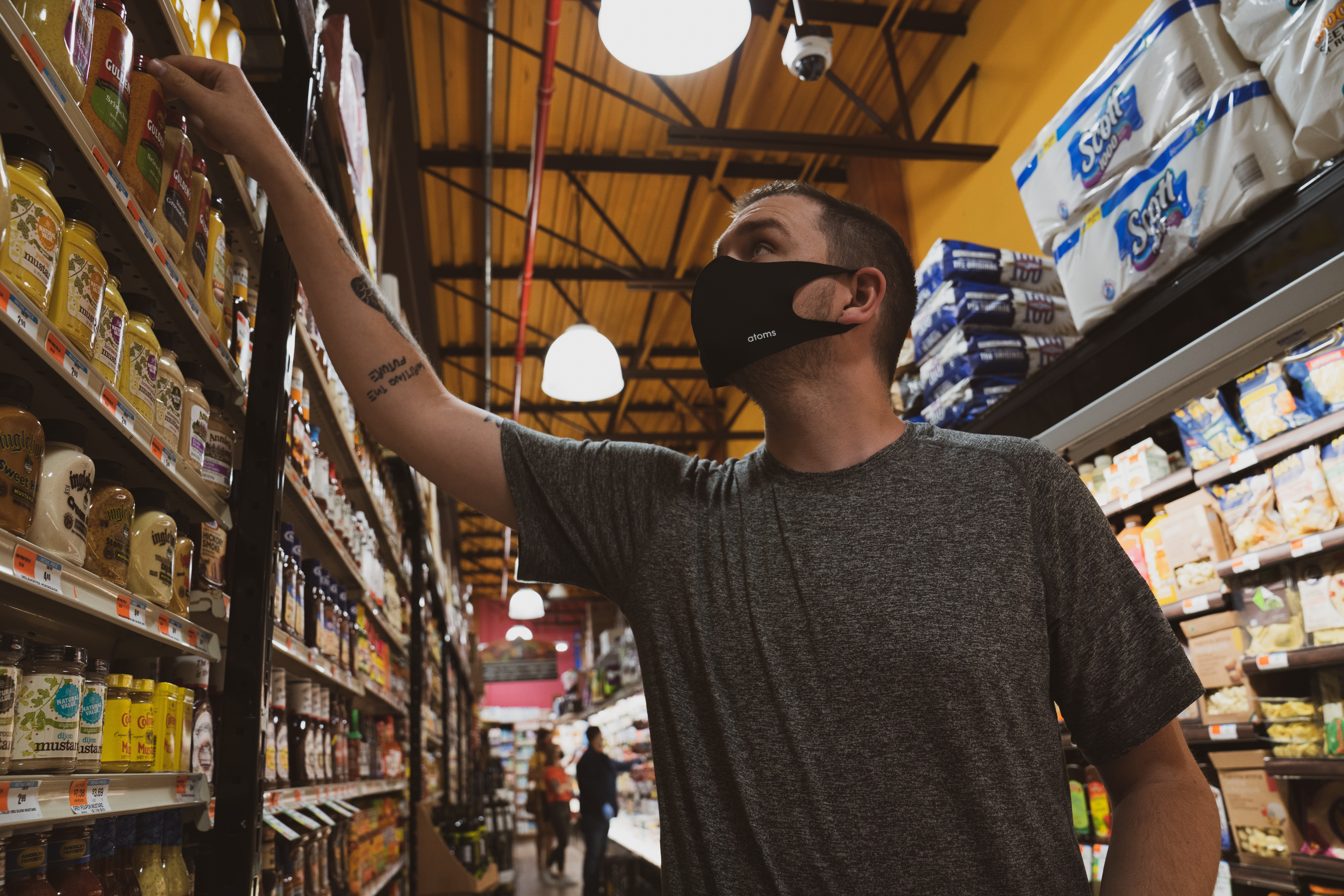
How will our idea of the high street evolve over the next 12 to 18 months? What does it mean for brands and what are the retail trends set to shape the future?
Featuring an industry expert panel:
– Simon Marsden: Category Development Manager, Tesco
– Louise Hughes: Collaboration Director, Bulbshare / Ex Category Controller ABInBev / Boots
Request our webinar recording now to unlock all the insights.
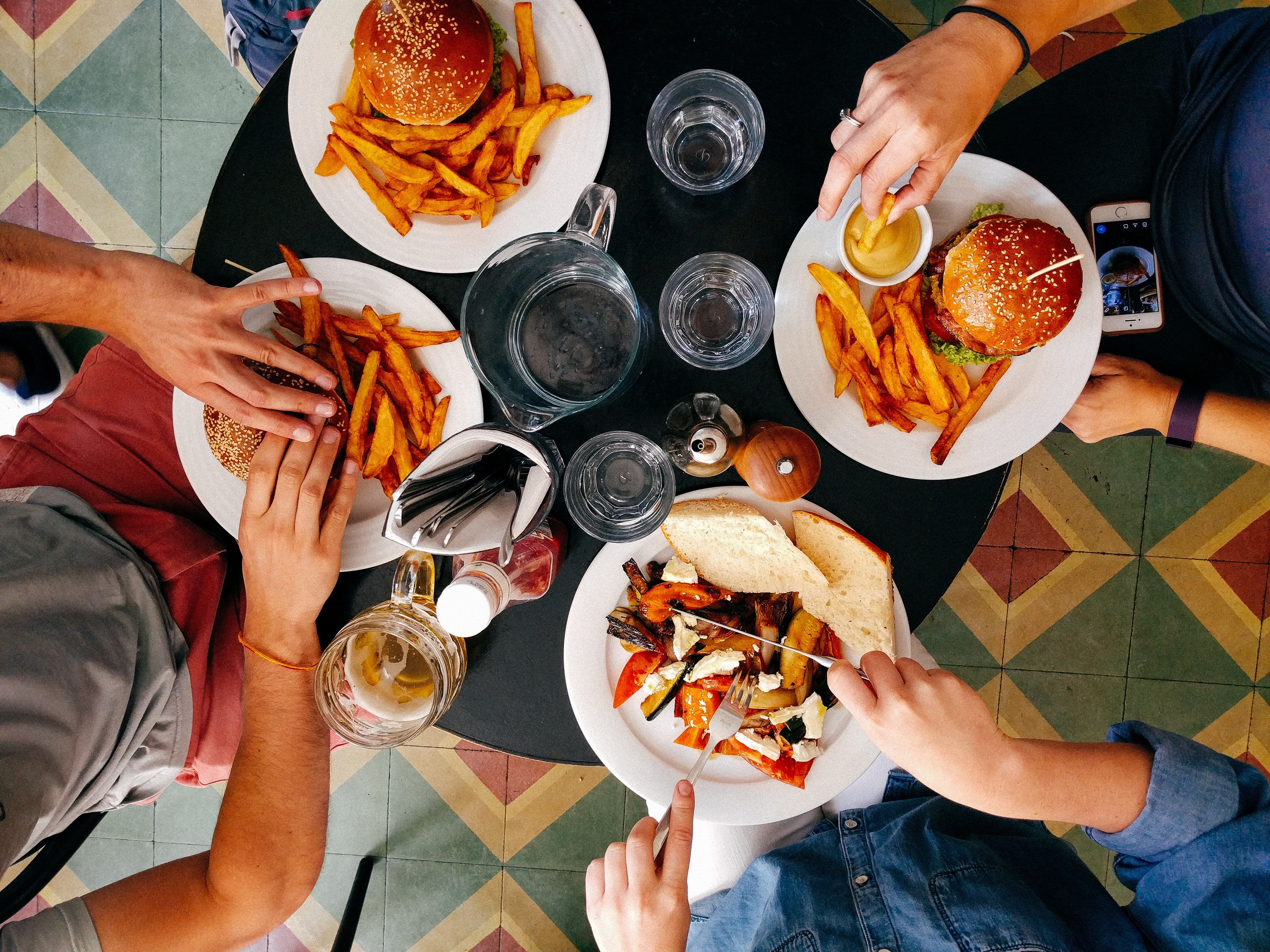
With the UK hopeful for a future free from Covid restrictions, it’s time to connect with our customer communities to see how they’re feeling about escaping lockdown.
Hundreds of our UK community members responded with rich insights about the government’s new roadmap, which has set out dates and plans for when hospitality, retail and travel can resume.
To discover the reaction of our communities, read on below…
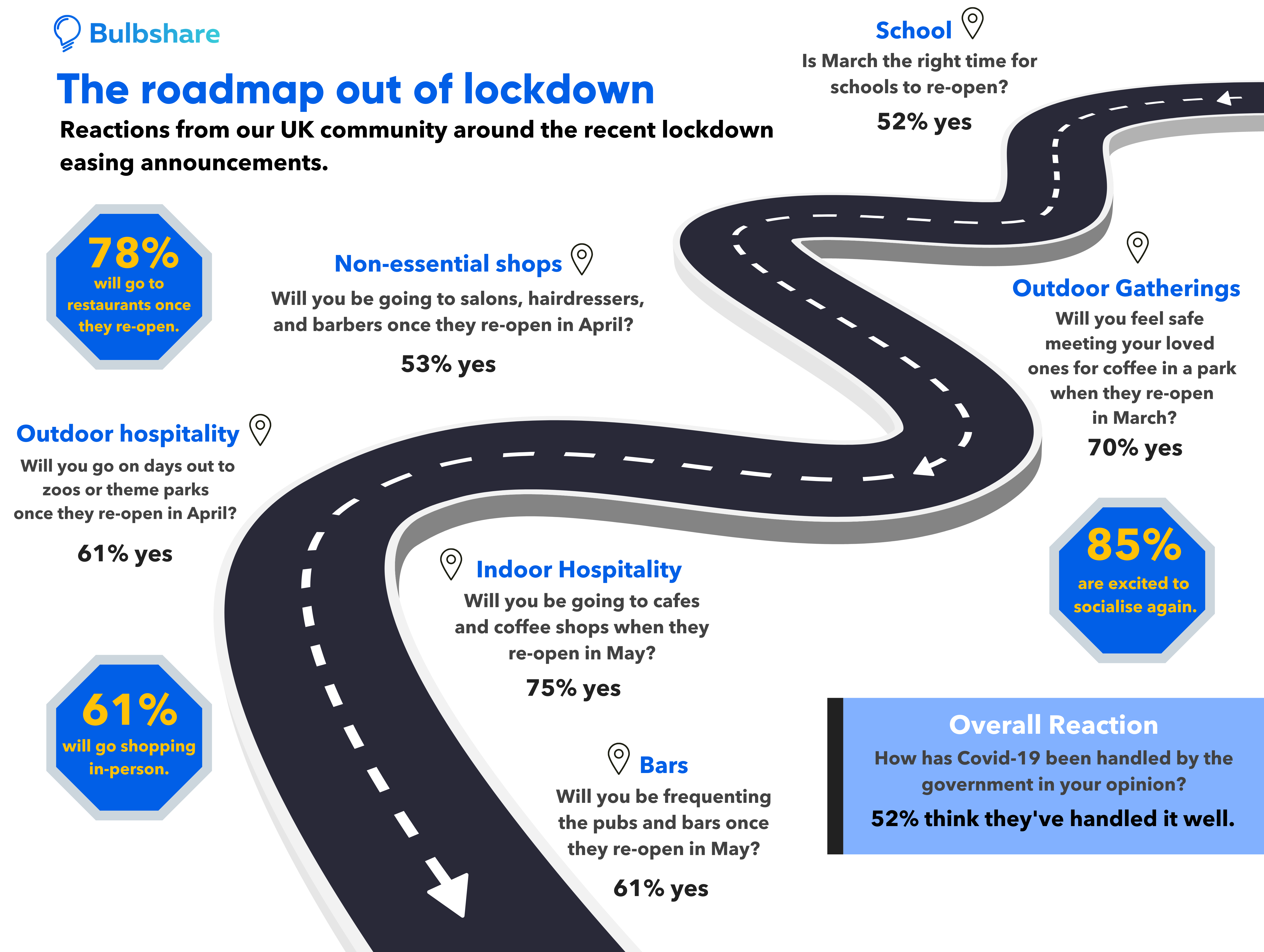
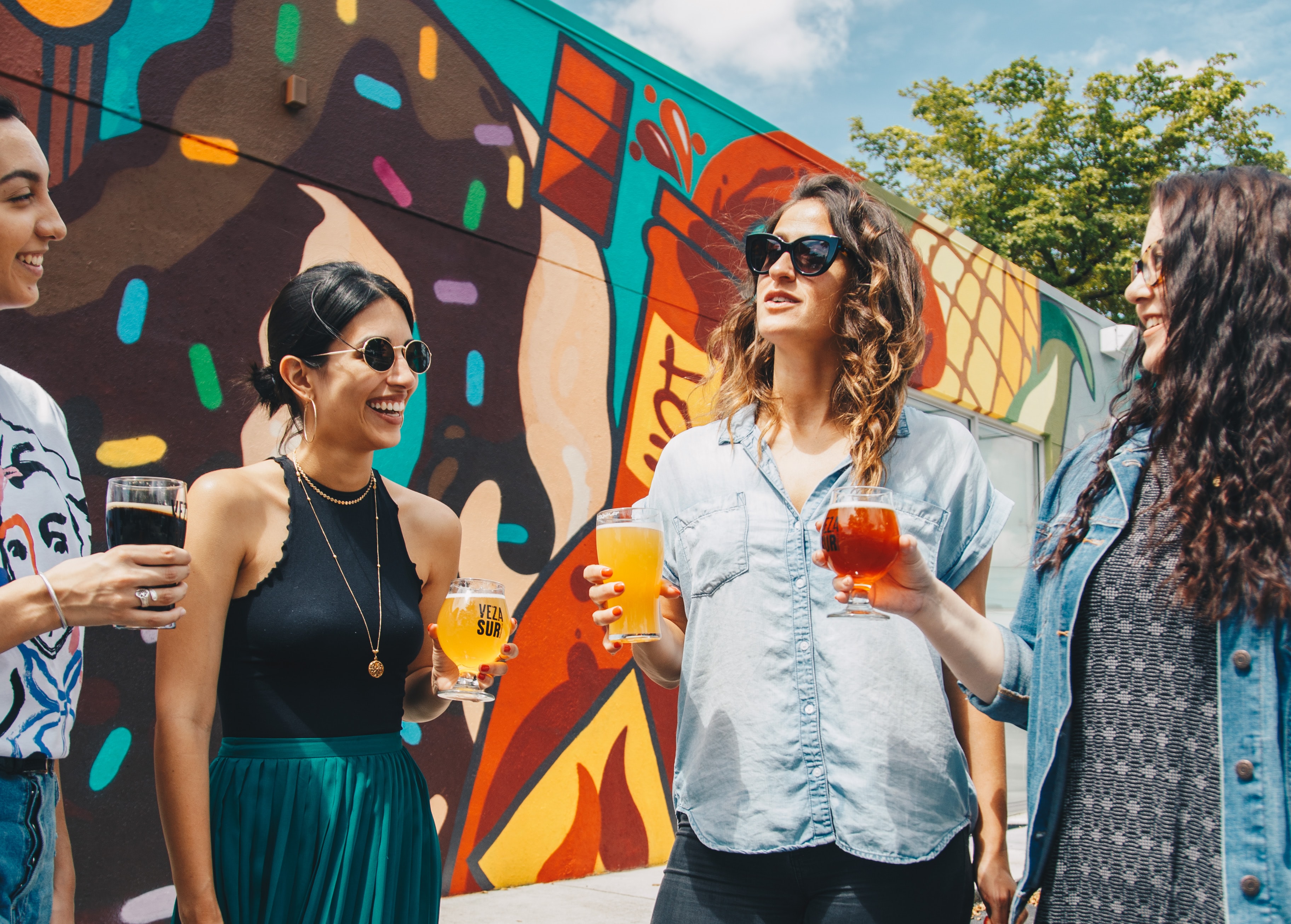
Join an expert discussion around the post-Covid consumer behaviour shifts set to impact the drinks industry this year…
Featuring industry insiders:
– Paul Thomas: Global Insight Director, Asahi, Ferrero, Diageo
– Louise Hughes: Collaboration Director, Bulbshare (Ex Category Controller ABInBev)
Download our webinar for all the insights…
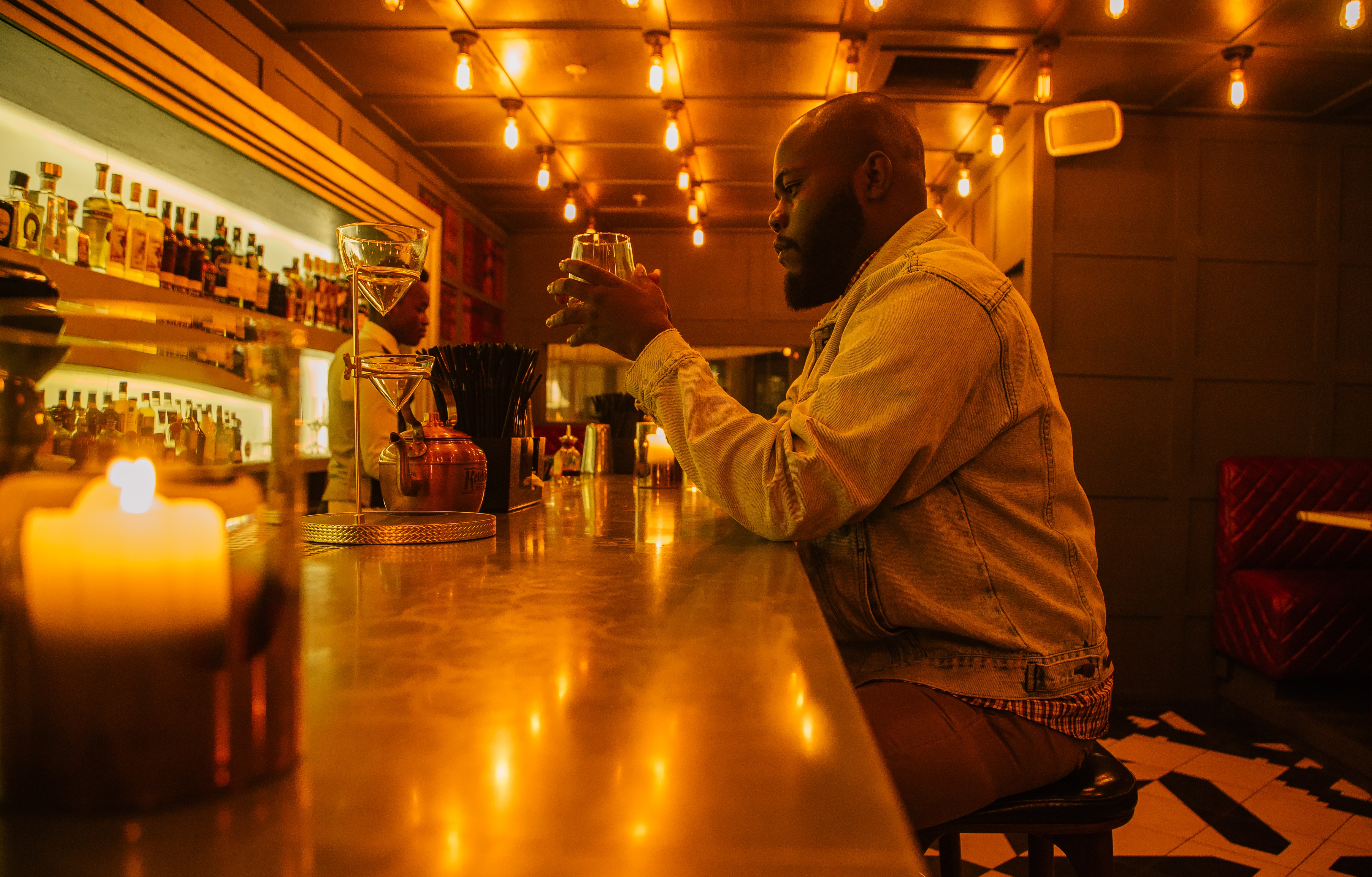
Join our panel of industry experts as they share key insights on what a Christmas of closed bars and pubs could mean for the drinks industry…
Thought-leading panel, including:
– Paul Thomas, Global Insight Director, Asahi
– Liz Davies, Category Lead, Budweiser Brewing Group
– Seb Szczukiewicz: Drinks Industry Insight Specialist, Bulbshare

Our Covid-19 Tracker charts the changing daily attitudes and behaviours of 1000s of global consumers – capturing real customer voice and forecasting future consumer trends. As Government restrictions ease, our week eight report takes a detailed look at the changing face of the Post Covid-19 consumer.
Click below to download our full report, tracking the thoughts, feedback and opinions of our global community from the onset of the crisis.

Satisfaction with Government varies across countries
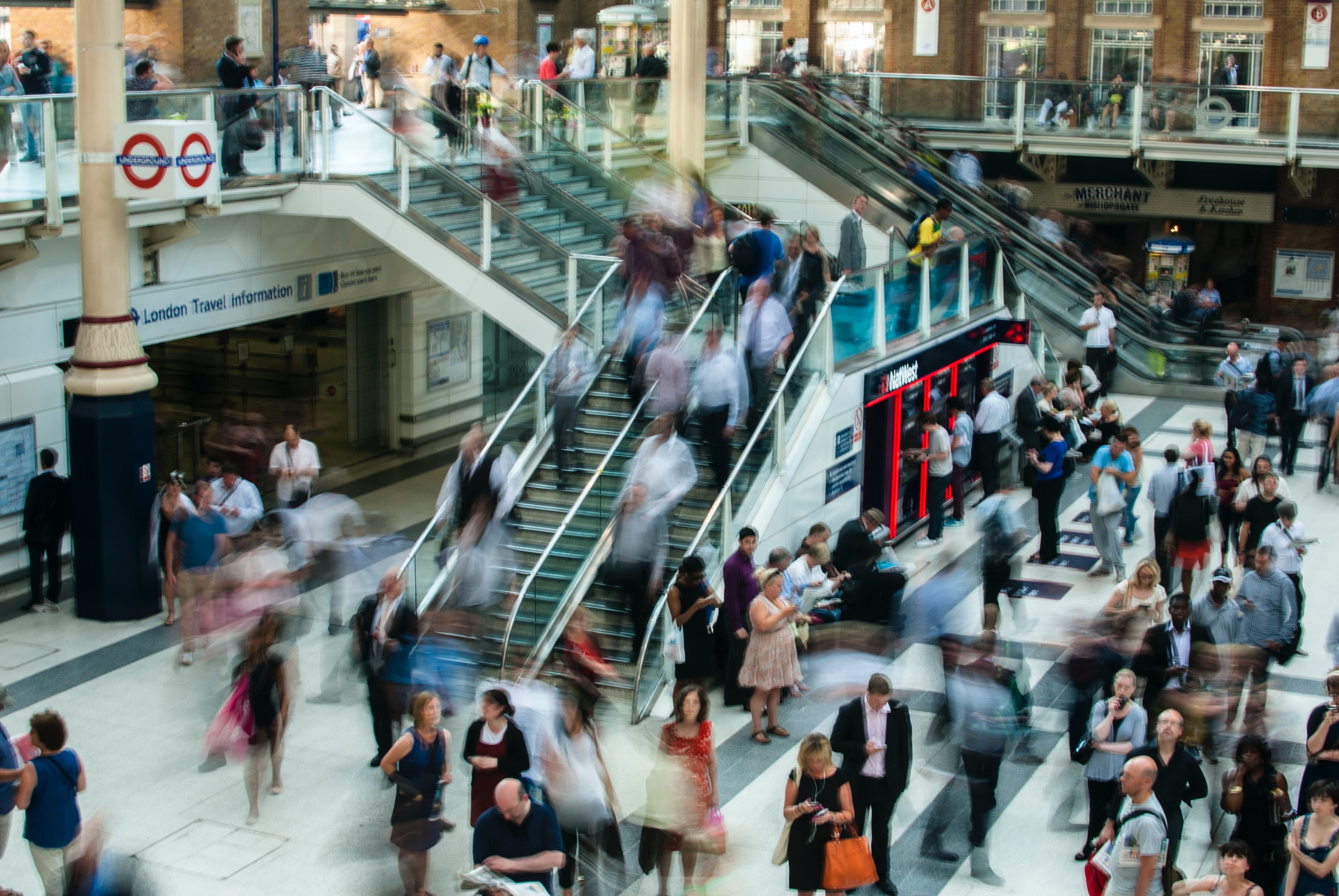
With each passing day, headlines surrounding the coronavirus seem to be getting more and more alarming. In the UK, we’re seeing public health advice about self-isolation, businesses making plans for remote working and the threat of schools and colleges being closed. News channels tell us that global stock markets are reporting record lows, international trade deals are being compromised and certain countries are planning bans on public gatherings. While the outbreak is yet to be confirmed as a pandemic, there’s no doubt that it is affecting the lives of millions across the globe.
One of the most widely publicised phenomena surrounding coronavirus is the panic buying of certain foods and household goods. This weekend, the Guardian reported seeing a 12-pack of handwash bottles (each bottle usually being priced at £1.29) on sale on Amazon for £150, and told us that delivery firm Ocado has asked shoppers to place orders early due to ‘exceptionally high demand’. Elsewhere, we are hearing that hand sanitiser prices on eBay have shot up by twenty times, and Tesco is restricting sales of essential food and household products – with shoppers limited to buying no more than five at a time of things like sanitiser, long-life milk and tinned veg.
With all this in mind, we asked our global community about the kind of impact the coronavirus is having on their day-to-day lives… And how they’re feeling, behaving and reacting to the atmosphere of alarm and nervousness both in the news and in public life.
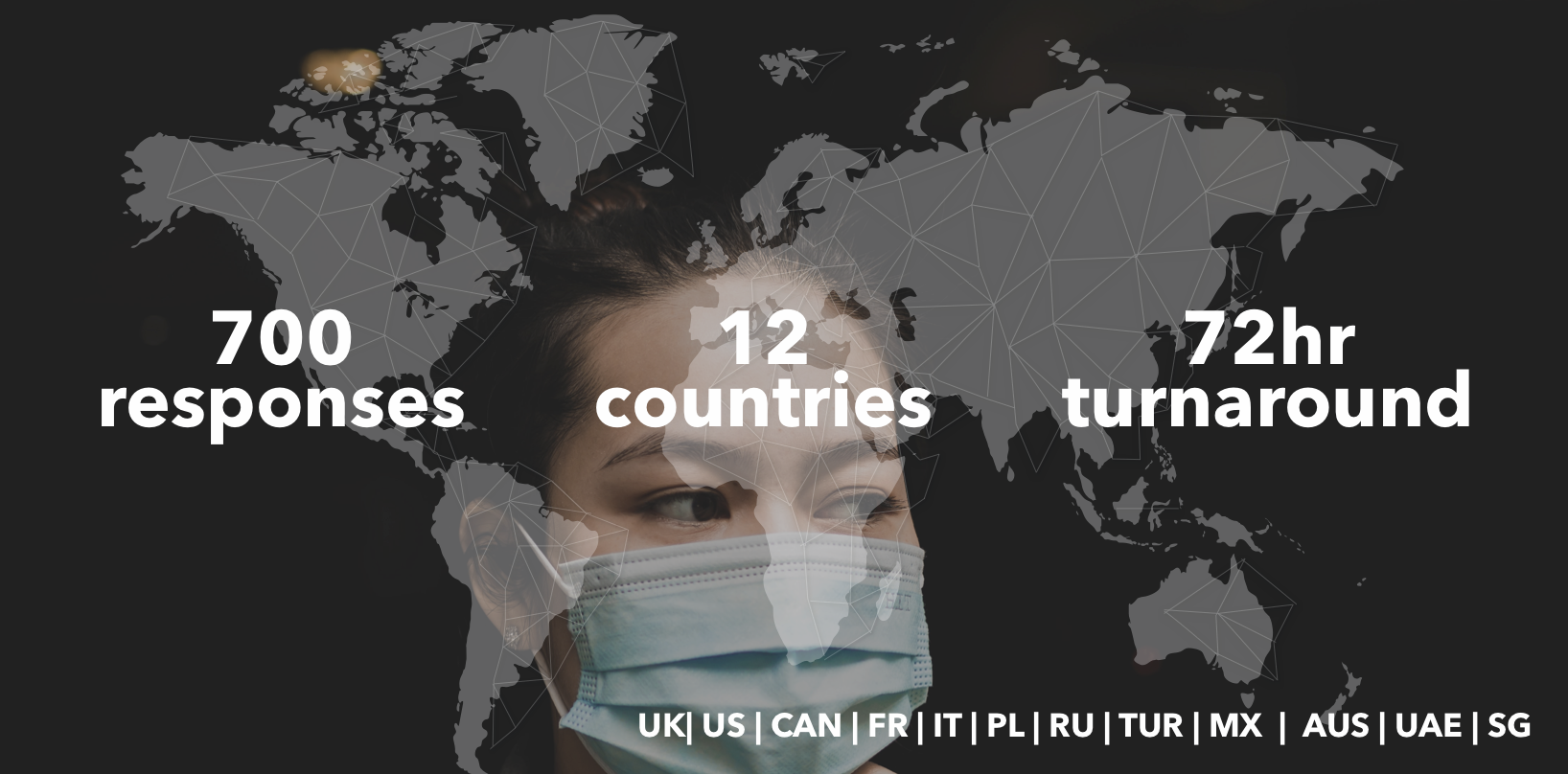
Pandemic of fear
Seventy-five percent of our community is either worried, or very worried about coronavirus. Contagious and with no vaccine, COVID-19 has created a fear of contact with other people – and it’s left elements of our community with feelings of fear and isolation. When asked directly how coronavirus has made them feel, we saw a prevalence of words like ‘anxiety’, ‘negative’, and ‘worried’ – and a community living in fear of contact with their fellow humans.
“Unfortunately, coronavirus has greatly influenced my way of life and that of others. I have adopted several ways of precaution, the same that have been recommended by the media. Stay at a certain distance from people, avoid physical contact such as kisses, hugs and handshakes, (and) avoid very crowded places. This, however, negatively influences the daily lives of each of us, because in this way we are not free to socialize… It isolates us.” Bulbshare user 🇮🇹
“You have to be patient and have an open and very positive mind because sometimes you get sick from the negativity and everything that they say in the news… You will get sick just thinking about it.” Bulbshare user 🇲🇽
“I have small children and therefore I am very worried while they still do not know the treatment for this disease. There are already so many deaths around the world and this disease continues to progress.” Bulbshare user 🇷🇺

Hygiene focus
These collective feelings of anxiety and fear are having a very real impact on how our community is behaving. 39% of our respondents plan to avoid large groups of people over the coming weeks, while 34% will avoid public transport, and 25% will postpone or change travel plans.
Unsurprisingly, hygiene is top of our community’s minds. Washing their hands more than ever, avoiding contact with others, wearing plastic gloves when in public and self-isolating at the first sign of illness are all top of the agenda – and hand sanitizer is the product of choice when it comes to shopping.
“Absolutely, this virus has greatly impacted my routine of doing things, starting with reducing the number of business trips I make – plus having to live under tight measures with fear.” Bulbshare user 🇺🇸
“Avoid (busy) places, do not say hello or kiss, bring a mask, wash my hands frequently, if necessary, stay in house.” Bulbshare user 🇲🇽
“I use hand sanitizer every day. I wear (a) face mask each time I go outside. I make sure to not touch surfaces that people often touch.” Bulbshare user 🇲🇾
“I carry out my life regularly, but I try to observe the sanitation rules more closely and I am avoiding going to closed and crowded places if not strictly necessary.” Bulbshare user 🇮🇹

Impact on shopping
Nearly 40% of our respondents say the coronavirus has affected the way they shop – with 36% saying they will be avoiding supermarkets and shopping online and 37% avoiding produce from overseas (the words ‘China’ and imports’ loomed large in our word cloud). 34% of our community will be stocking up on non-perishable products, while 27% will be avoiding meat.
The main things mentioned by our community are cleaning products and non-perishable foods such as canned goods, pasta and rice and frozen vegetables. While motivations behind stockpiling are a mix of fear of supermarket shelves running low on essential items (some report already seeing this), plus concerns around having to stay in isolation for extended periods with no access to shops.
“Stockpiling on non-perishables and household items like toilet paper, cleaning supplies like bleach, as well as soap and hand sanitizer.” Bulbshare user 🇨🇦
“I am stocking up on food and on other consumables, such as cleaning materials and toiletries, that I wouldn’t want to be without. My aim is to be able to get by for a month without having to go shopping – if it becomes necessary for me to stay at home.” Bulbshare user 🇬🇧
“When it comes to coronavirus, I try not to panic. However, due to the fact that I noticed that there are significant shortages on store shelves, I also decided to stock up on buying a few kilograms of flour, a few packets of pasta and sauces in a jar, ham and sausages in cans and jars, rice, and a few kilograms of frozen vegetables and fruit. The plans for weekend shopping also include the purchase of several five-litre bottles of water just in case.” Bulbshare user 🇵🇱
‘Don’t panic’ sceptics
While the majority of our community are concerned about the coronavirus and changing their behaviour accordingly, there is a notable contingent who are going about business as usual and feel that many are panicking unnecessarily. These people may be washing their hands more, but are not changing the way they shop, and are certainly not stockpiling. And there are some who feel that over-reporting of the virus has led to feelings of unneeded nervousness and overly drastic behaviour.
“I have not done anything different. I think we are at a very low risk as we usually stay in our local area, have not been in contact with overseas travellers, and (I) definitely will not indulge in panic buying.” Bulbshare user 🇵🇱
“Nope, carry on living. The only difference is that I have to work around people who are panicking.” Bulbshare user 🇬🇧
“I haven’t done anything differently since finding out about coronavirus. I think a lot of people are over panicking… The media need to stop scaremongering.” Bulbshare user 🇬🇧
Stay in touch with Bulbshare for continued reports around global reactions to the coronavirus over the coming weeks.

Edelmen published its 2020 Trust Barometer earlier this year and to put it bluntly, the results weren’t good. The news is that consumer trust is still super low; and that continued economic uncertainty has meant a growing mistrust of institutions such as governments, media, global companies and brands.
The research consultancy reported that both job insecurity and wealth inequality continue to grow – meaning widespread and ‘deep-seated fears about the future’ among global consumers. Factors such as the continued threat of another global recession, the onset of climate change and the rise of far-right politicians have meant heightened scepticism around everything from party politics to brand marketing campaigns. In short, gaining trust has never been more difficult.
Edelmen’s advice is to embrace a whole new strategy for building trust: ‘balancing competence with ethical behaviour’. With this in mind, we asked our global community what they believe brands can do to buck the trend, and become a trusted friend to their legions of potential customers…

As ever, our global community answered emphatically and from their list of responses, we’ve compiled a ten-step toolkit to building consumer trust…
1. Show your workings
Our community trust brands that are open, honest and transparent about everything they do. In the light of some major global brands being exposed for ‘greenwashing’ (making misleading claims about their own sustainable credentials), it’s more important than ever that marketing messages are rooted in genuine actions.
“Be real about the supply chain and products used. Lying about bring ‘sustainable’ is more damaging to their reputation than using the (wrong) products in the first place…” Bulbshare user 🇦🇺
“For sure they could give tangible proof of what they do… It is not enough for me to hear their statements, I would appreciate having the instruments to see proof of what they say they are doing. If a company says that they will plant a tree for every 100 t-shirts sold, I would love a kind of Google Earth of the zone where they are doing it in order to see if the green area grows or not…” Bulbshare user 🇬🇧
2. Quality, heritage, tradition
The word ‘quality’ cropped up time and time again in our survey, with our community telling us that products and services rooted in tradition, heritage and provenance are key to building a brand’s reputation.
“I trust the brands that produce quality products. I could mention Italian food brands such as La Molisana or Rummo Pasta… In fact, there are many Italian food brands that present artisan products that reflect the authenticity of the territory.” Bulbshare user 🇮🇹

3. Be ethical
Ethics is still key, with both younger and older consumers continuing to place massive importance on genuine moral and social purpose. Check out our community’s Purpose Power report for ten brands admired by our community for their ethical stance and actions.
“The brand I really trust is Toyota. This company really cares about the environment and the future of our planet. It is no coincidence that this company leads the rankings of the most ethical companies in the world. I feel proud that I own a car of this brand.” Bulbshare user 🇷🇺
4. Listen to your customers, collaborate and co-create
A recent report from research firm Iris identified ‘participation brands’ as those that involve their consumers in their creative and marketing processes, saying that these brands ‘outperform the market, drive advocacy and command a premium’. Our community couldn’t agree more, consistently telling us how ‘being involved’ is the most powerful way to build trust. Check out our toolkit on How to Become a Participation Brand for a step-by-step guide to putting customer voice into the heart of your operations.

5. CX is king
Believe it or not, brands are STILL getting customer experience very wrong. And bad CX was mentioned time and time again in our survey. Read our report on Co-creating your Customer Experience for everything you need to know about putting customers in the driving seat when it comes to CX.
6. Be local
As reported in our Active Altruism piece, our community values brands that support their local communities. If you want to build trust, looking after your own is a simple way to get there. Invest in local community projects, source locally and partner with other local businesses.
“Co-op is trustworthy. It does so much for the local community… British products and local suppliers are great for our economy.” Bulbshare user 🇬🇧
7. Choose a cause
Our community gets behind brands that are vocal about the causes they support. Our Moral Brands report shows how our community trusts organisations that put causes at the heart of their messaging and publish the real-life work that they are doing.
“The brand that I trust is Lucozade as in the summer of 2019 to get the nation behind England’s Women’s team, Lucozade Sport rewrote the unofficial anthem of the World Cup ‘Three Lions’ as a powerful testament that expresses the trials and tribulations of overcoming prejudices against women in sport.” Bulbshare user 🇬🇧

8. Honesty is the best policy
It sounds obvious, but our community doesn’t trust brands that lie. If you’re going to make big claims about your moral and social integrity, make sure they’re impervious to scrutiny. Modern consumers are savvy and will spot a half-truth a mile off. Honesty is paramount for our consumers.
“They must be honest first of all! If they write that there is no sugar, then I want no sugar. A customer must know what they are really buying.” Bulbshare user 🇵🇱
“Be honest and truly do what they say, instead of showing fake facts to prove they are good when they are not.” Bulbshare user 🇮🇹
9. Be consistent
Consistency is key. Our community has told us how scattergun campaigns supporting multiple causes are confusing and don’t feel authentic. To build trust, brands need to pick one cause and champion it consistently throughout everything they do.
“Be consistent and have a strong message that they follow and inspire others to as well…” Bulbshare user 🇬🇧
10. Save the world
It goes without saying that modern brands are expected to be morally and socially responsible. But in an era when governments are widely considered to be falling short on tackling global problems such as wealth inequality and climate change, it falls to brands to help save the world.
“(I trust) companies looking for the best solutions to overcome the problems that grip the planet and its delicate life cycle and struggles.” Bulbshare user 🇮🇹
“Brands should organise the recycling of garbage that remains after using their products, as well as directly offering their customers the opportunity to bring garbage for recycling. This responsibility to people and nature is worthy of respect and determines the authenticity of the brand.” Bulbshare user 🇬🇧

The outdoors has never been more ‘in’. Recent years have seen a range of once niche pastimes hit the mainstream, with outdoorsy brands like Patagonia and The North Face enjoying a whole new cachet as the masses look to show off their rugged credentials.
From wild swimming, camping and kayaking to bouldering, trekking and climbing – everybody’s at it. If someone told you ten years ago that two of the hottest labels on the high street would be climbing brands, would you have believed them? It used to be only geography teachers wore ‘outbound clothing’, now it’s fashionistas, rappers and popstars.
So, what’s prompted the shift? Why are more and more people jumping on the outbound bandwagon? And what is it about the last decade that’s made people go ‘wild’ for the great outdoors?

We asked our global community why it’s more important than ever to connect with nature and spend time in the outdoors. The answer is overwhelmingly about mental health and wellness – and it’s a reaction to anxieties surrounding social media, technology and the digital age. Your North Face puffa might be bang on trend – but it’s also about what it represents: freedom, escape, physical endeavour, the big, wide world. The antithesis of what for many are the trappings of modern technology.
Outbound boom
The Association of British Climbing Walls (ABC) tells us numbers of climbers are growing by 20% year-on-year. While the Outdoor Swimming Society saw numbers grow to 70,000 in 2019, compared with just a few hundred ten years before. Our global community is part of this trend. 78% of our Bulbsharers now go on holidays that are based around outbound pursuits and 40% do outdoorsy activities once a week or more. When asked about the types of things they get involved in, hiking, camping, cycling, wild swimming and fishing come out on top.
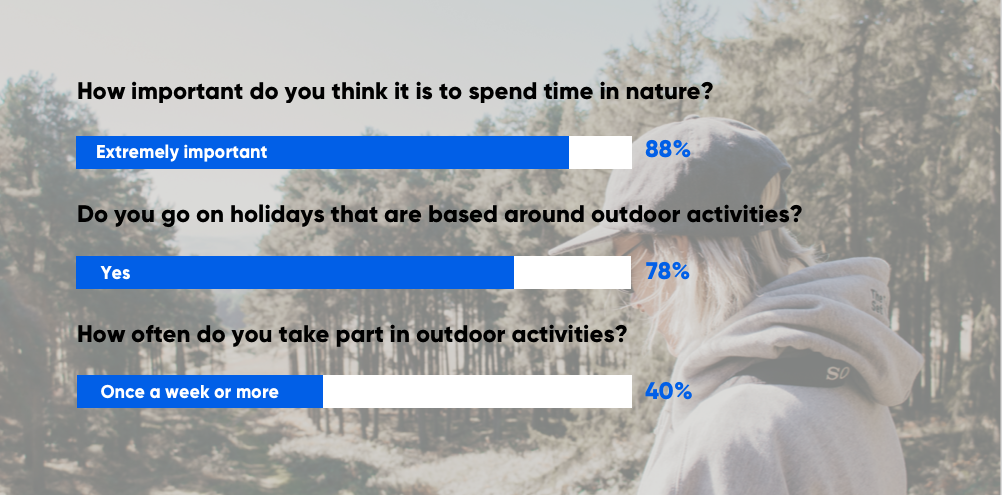
The motives
97% of our community say connecting with nature can help with their mental health. But even before we directly asked that question, an overwhelming majority mentioned it when talking about their love of the outdoors – drawing associations with positivity, calmness, self-esteem and beating anxiety. And just as our community associates the outdoors with positive mental health, they blame social media for those anxieties they need to escape. 89% of our users said connecting with nature is more important in the age of social media, and in our open text responses, social media and technology loom large in our word cloud.
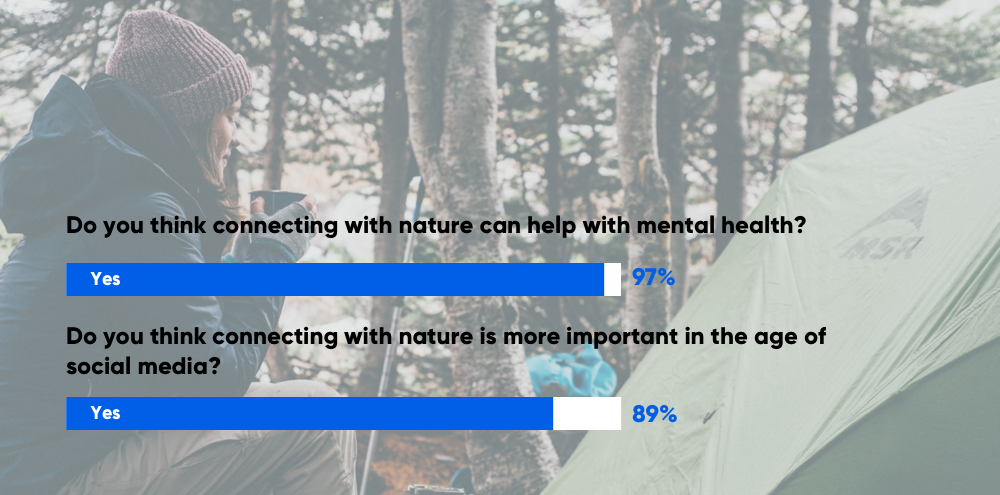
Return to the source
What we are seeing is a mass reaction to the pressure of social media and the trappings of modern technology. As people’s lives are increasingly being made more tracked, more monitored, more digital, nature offers the exact opposite – freedom, calmness, release.
The great outdoors then, can be seen as a new frontier for brand marketing, messaging and positioning. Brands should be aware of the new role nature has to offer in the lives of consumers – as well as their concerns about technology and the impact of mental health. It’s time to bake ‘the great outdoors’ into campaigns, competitions, and content. Wild swimming and outbound holidays are no longer the preserve of a niche, ‘intrepid’ crowd – they have mainstream relevance and mass appeal.

Key Quotes
“(Spending time in the outdoors) is paramount for our mental and physical health. Whenever I am struggling, a walk is the perfect way to clear my head…” (Bulbshare user, 29, UK)
“I like to get outside… It’s nice to get a chance to disconnect from devices and get a bit of sun.” (Bulbshare user, 37, Australia)
“In this day and age of people with eyes always glued to a screen, it is important to get outside and look around. To get the wind in your hair and the sun on your face is a great way to relax and recharge.” (Bulbshare user, 66, UK)
“It is a soothing mechanism to be able to connect with nature – I find it calming and relaxing for both my peace of mind and my relationship with others.” (Bulbshare user, 43, Toronto)
“Because only when I have close contact with nature, I feel that everything is possible…” (Bulbshare user, 28, Poland)
“We all know that nature gives us peace and health. Outdoor activities make us feel calm and relaxed and can ease tension and depression.” (Bulbshare user, 18, Malaysia)
“Social media is exhausting for our brains – unlike anything that has come before…” (Bulbshare user, 30, Poland)
Key take-outs

There’s been no shortage of 2020 life hacks shared by our global community in recent weeks. When we asked our users how they’d be changing things up in the new decade, we saw 1000s of responses around more considered consumption – giving us a picture of a new, more sustainable, eco-friendly and, health conscious consumer. But what stood out more than anything was our community’s philanthropic streak – with a focus on community work and making changes that are altruistic rather than selfish (see our New Year New You blog for a full report).
You might call it the Gen Z effect? A chain reaction that began with Greta Thunberg’s classroom walk-outs and filtered through to create a new world order of active do-gooders – motivated, mobile and ready to make change. Whatever the cause, it’s reflected in the thoughts and feedback of our global community of Bulbshare users who are looking to be kinder, more actively caring people in 2020 – with a focus on bringing their communities together.
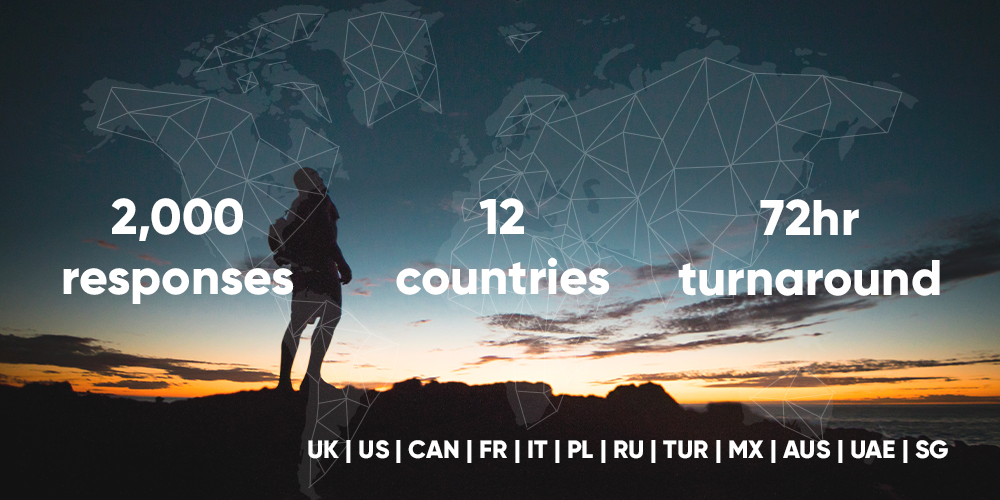
The threat of climate change, the growing gap between rich and poor, and the rise of more divisive politicians in the mainstream has seen a reactive sense of ‘pulling together’ among our community – with our users striving to make 2020 the year when they focus on charitable work and community action. For brands and consumer organisations, this is the year to put purpose on overdrive – allowing it to lead brand positioning and sit at the heart of messaging and campaigns.
“My new year’s resolution will be to volunteer more as there is so much to do to help our communities. I feel my time would be better spent doing things which are uplifting, and I would like to make a difference, however little. There is a local food bank I want to volunteer at so I’m looking forward to the new challenge in 2020.” (Bulbshare user)
“My hopes for today and the future are… On-going positivity, companionship, improved environmental stability and increased community spirit.” (Bulbshare user)
“(In 2020) my philanthropy and sensitivity to social problems will continue” (Bulbshare user)
“(In 2020) politicians should promote awareness, love and patriotic spirit to all citizens instead of hatred among them…” (Bulbshare user)
More than ever, global consumers are seeking brands that stand for good deeds and community action. Our Purpose Power blog highlights 10 examples of brands doing ‘impact’ in surprising, innovative and authentic ways, as voted by our Bulbsharers, and shows how box ticking around purpose is no longer good enough – in 2020 brands must put their social good credentials at the heart of what they do, but they must listen to their audiences and get behind the causes that resonate with them.
The background
Since the phenomenal success of Tom’s Shoes’ ‘Buy a Pair, Give a Pair’ campaign (it all seems so long ago now), marketing managers have cottoned on to the fact that ‘purpose’ is a whole new channel through which to engage. The result is that brands have become like super heroes: Nobly fighting injustices, standing up for what’s right and bravely protecting those in peril. ‘Doing good’ has become the new norm, and instilling a moral or social purpose into operations – investing in causes and shaping marketing campaigns around changing the world for the better – is big business.
But is it enough? In a new world where brands are like political parties – being judged just as much on their policies as their products – is jumping on a moral bandwagon still going to cut it? The progressive brands are those that properly engage with their audiences, discover the issues that affect their worlds, and support them in taking pertinent, tangible actions that really resonate. Our Bulbsharers tell us they’ll be leading on community action in 2020 – they expect brands to do the same.
The sceptics
As ever, consumers are sceptical to the melee of moral messages. Do the marketeers at the heart of social purpose campaigns have dollar signs in their eyes? Do brands really care? Or is it a fad, full of hollow sentiment, aimed at engaging gen Z. According to a report by the Endelman Trust, 65% of young consumers think companies overstate their environmental credentials, while 45% are sceptical about the causes brands support.
It’s hardly a surprise that media-savvy, super-informed and politically mobile gen Z consumers aren’t taken in hook, line and sinker by brand rhetoric. Striving to take action themselves, and inspired by radical activists like Thunberg, they’ve been made sceptical of the voices of the establishment by politicians who talk the talk but don’t walk the walk – and they extend that same pessimism towards so-called ‘do-gooding’ brands.
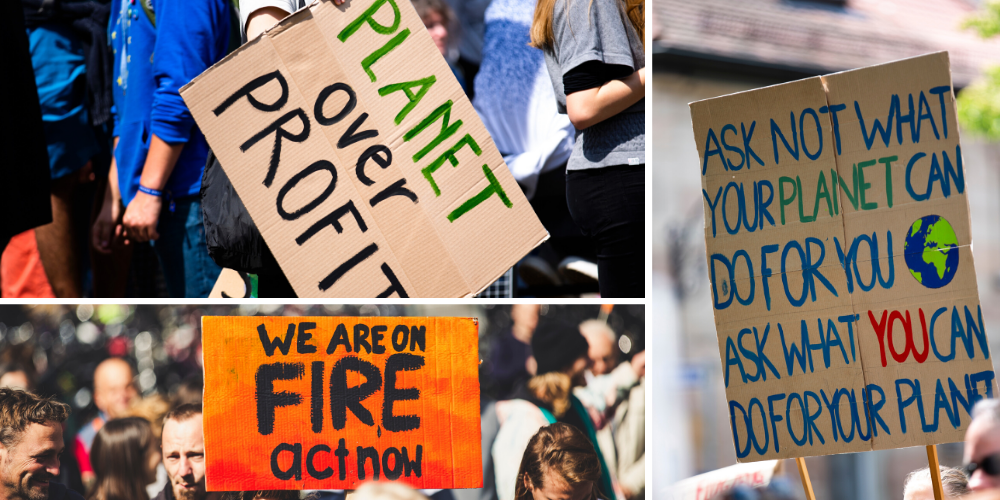
How to do it right: co-created purpose
According to a Fit for Purpose report by the London agency, Radley Yelder, which detailed 2017’s top 100 purpose-focused brands, 83% of mission-led organisations instil a strong sense of collaboration into their operations – either with competitors, employees or their customers.
When Tesco launched its food waste campaign, its chief executive Dave Lewis told Marketing Week how the company’s new ethical focus was principally driven by customer expectation. With customers at the heart of the purpose drive, it makes sense that brands should involve them in the purpose process – informing their campaigns with detailed insight, and allowing their audiences to co-create those campaigns with them.
If a brand really wants to address the most relevant causes that resonate with its customers, it needs to understand what those causes are, how audiences feel about them, and the best ways to involve people in taking action. See our Purpose Power toolkit below for the best ways to engage your customers around being authentically altruistic, by discovering the causes that have meaning for them.
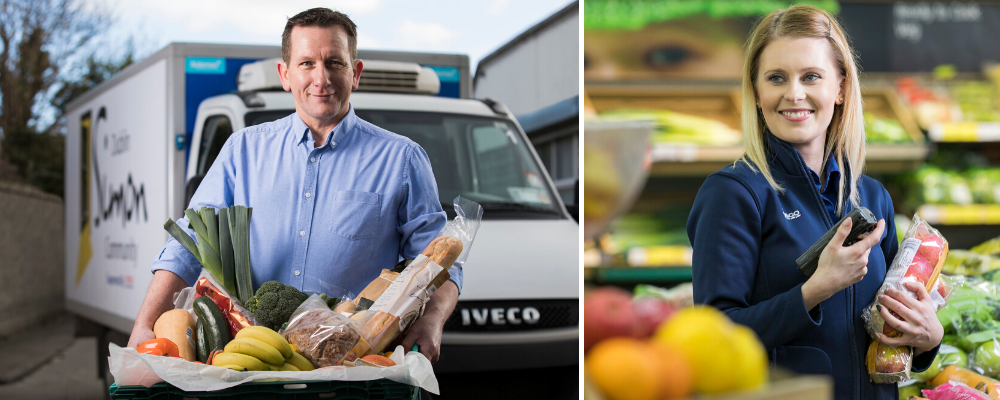
Key take-outs
Five ways to engage your customers by co-creating your brand mission…

We all know the ‘New Year New You’ clichés: eat less, run more, be kind to others, etc. But when it comes to really living better in the new decade – implementing lasting rather than quick-fix solutions – what are the concerns that people are actually addressing? And how will 2020 lifestyle changes reflect the economic, social and environmental factors at play in the current world?
We asked our global community to talk about the New Year in a series of briefs – ranging from the simple changes they want to make to their own daily lives to the broader concerns they have for the planet in 2020. From all the insight, ideas and stories shared, plus a look at the ‘New Year New You’ blogosphere, we’ve put together 10 ways we think people will be changing their lives in the coming year – as well our advice for how global brands should be reacting.
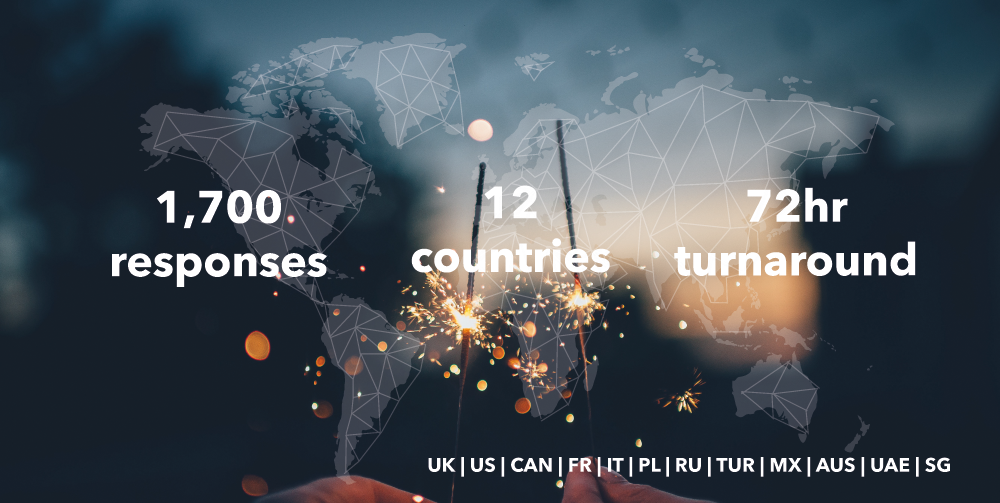
Cutting-out waste. Reducing screen time. Properly turning off from work and implementing lasting dietary changes. Here’s our 10 ways for a happier, healthier, more sustainable existence in 2020…
Improving my mental health
Any New Year New You blog to is sure to mention improvements to physical health (more exercise, better eating, blah, blah), and don’t worry this one does, but we were surprised by just how many of our Bulbsharers’ 2020 focus was on improving their mental health. From being happier and more optimistic to conquering anxiety, stress and anger management, it seems a recent spotlight on mental health awareness has had a big impact on our users. More than ever, brands need to be onboard with mental health issues – check out our mental health blog for key take-outs on how to connect with consumers around this pertinent subject.
“I would like to stop biting my nails and conquer my anxiety…” (Bulbshare user)
Making a difference and helping communities
It seems that unsettled times, prolonged economic instability and an increase in more divisive politics have made people want to do more to bring their communities together.
“My new year’s resolution will be to volunteer more as there is so much to do to help our communities. I feel my time would be better spent doing things which are uplifting, and I would like to make a difference however little. There is a local food bank I want to volunteer at so I’m looking forward to the new challenge in 2020.” (Bulbshare user)
“My hopes for today and the ‘future’ are… On-going positivity, companionship, improved environmental stability and increased community spirit.” (Bulbshare user)
“(In 2020) my philanthropy and sensitivity to social problems will continue…” (Bulbshare user)
“(In 2020) politicians should promote awareness, love and patriotic spirit to all citizens instead of hatred among them…” (Bulbshare user)
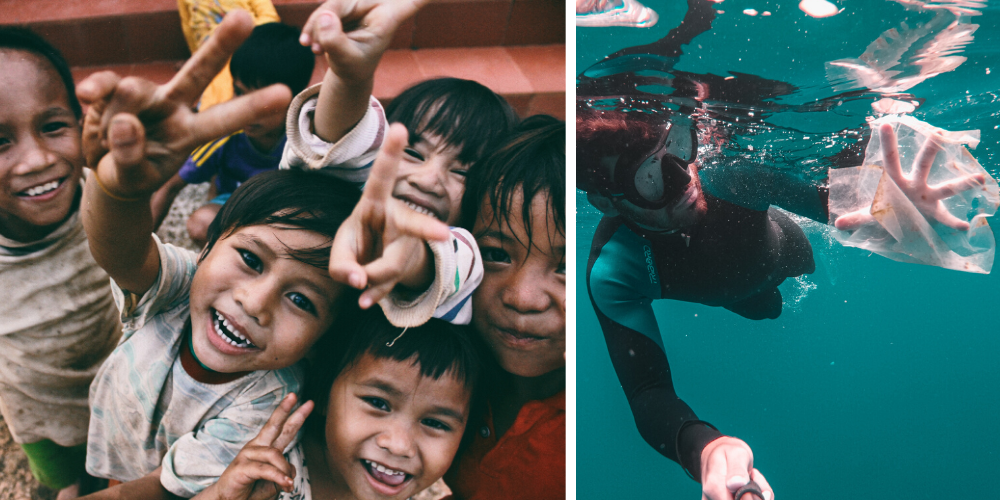
Striving to be waste-free
Climate change and environmental issues were top of our Bulbsharers’ agendas when asked about hopes and fears for 2020. Our users talked about cutting out plastic and striving to be waste-free, taking less planes, using less water and using as little packaging as possible. Our community wants to ramp up its efforts to reverse the damage already done to the environment and stop our planet being “ploughed of its resources”. Check out our Recycling Frustrations blog to see how brands can connect around the issue of plastic.
“I hope that the world becomes a better place and reduces plastic consumption.” (Bulbshare user)
“Day by day, global warming is a bigger threat for us. The weather is changing and it is affecting everyone in the world.” (Bulbshare user)
“We will be more focused on natural products… Knowing where they come from and the chemicals used to make them. We need to be doing more recycling in terms of the clothes we wear, and be more sustainable in our everyday lives.” (Bulbshare user)
“I predict a big change in the way climate is handled. I think more people will be taking notice of our impact on the planet, and changing the way they do things. I hope there is a review of policies when it comes to countries in trouble, requiring relief. And I think people will be taking a more natural, hands on approach to food, as prices are bound to rise due to the fire situation.” (Bulbshare user)
Reducing my meat consumption
Regular subscribers will know we’ve covered this subject a lot in recent weeks (explore the meat as an ‘event’ trend in our Flexitarianism blog), but it really does just keep coming up. Make no mistake, reducing meat is going to be a widespread lifestyle choice in 2020, and the motive is as much around the health of the planet as it is around the health of the individual.

Drinking less alcohol
Another reoccurring theme with our Bulbsharers – drinking less and moving towards no and low-alcohol alternatives. See our No Low Rising blog to learn how your brand can jump on the burgeoning no and low alcohol bandwagon in 2020.
Reducing screen time for a calmer mind
Previous Bulbshare briefs have told us how our community is increasingly moving away from social media – partly due to negative associations around bullying, privacy and targeted advertising. But our New Year New You briefs have showed us that people are looking to reduce screen time – particularly late night social media scrolling – to achieve a more relaxed mind and sleep better.
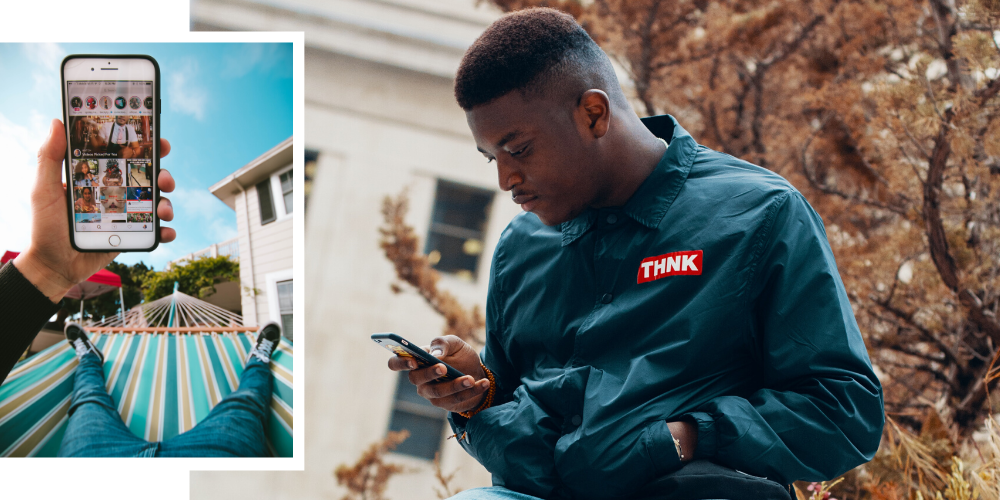
Addressing my work-life balance
Spending more time with family is a big concern for our Bulbsharers – and they mean to achieve it by addressing their work-life balance. Knowing when to turn off, refraining from constant email checking and prioritising quality family time over being glued to work emails on their phone.
“My new year’s resolution is to spend more quality time with the family and focus on enjoyment and living life rather than living to work. I feel this will help the bond in my family grow stronger and will take the stress out of things… to allow us to enjoy life more.” (Bulbshare user)
Utilise apps to improve my exercise regime
Let’s face it, doing more exercise is pretty standard when it comes to New year New You. But 2020 focus will be on engaging with technology to ensure exercise routines are organised, optimised and don’t hit the back burner after January. There’s hundreds of workout and exercise apps out there like Zeamo and Adidas’ Runtastic, as well as government initiatives like Public Health England’s Couch to 5K, which operates through its own app.
No more diets
Our Bulbsharers are all about eating healthily, cutting out meat and focusing on eating natural and non-processed food, but the word ‘diet’ is notably lacking from our responses. Our New Year New You briefs showed more positivity around eating, with sentiment being focused on eating the right things rather than eating less.
Financial stability… Reducing my debt and managing my finances better
It seems clear than a prolonged period of global fiscal uncertainty has increased our Bulbsharers focus on their own finances. The global economy was mentioned heavily in our Hopes and Fears for 2020 briefs, with a large number of users being keen to get out of debt, change jobs in order to earn more money and get themselves into more stable financial positions.
“(In 2020), supplemental income (will be) very important. People say, happiness cannot be bought with money, but without money you cannot be happy.” (Bulbshare user)
“My fears are that the economy and government will not get better and Brexit will follow us for years to come, and the nation will be cleaning up the mess instead of reaping the rewards… (As) the rich get richer and the poor poorer.” (Bulbshare user)
Key take-outs

Over the past 20 years, raised awareness and a dismantling of negative stigma has meant a new openness in discussing the issue of mental health, as well as a rise in people seeking help.
We asked our Bulbshare community to talk about the subject… Their experiences, their coping strategies and what they believe are the driving factors. With over 800 responses across 7 different countries, this is what our Bulbsharers had to say…
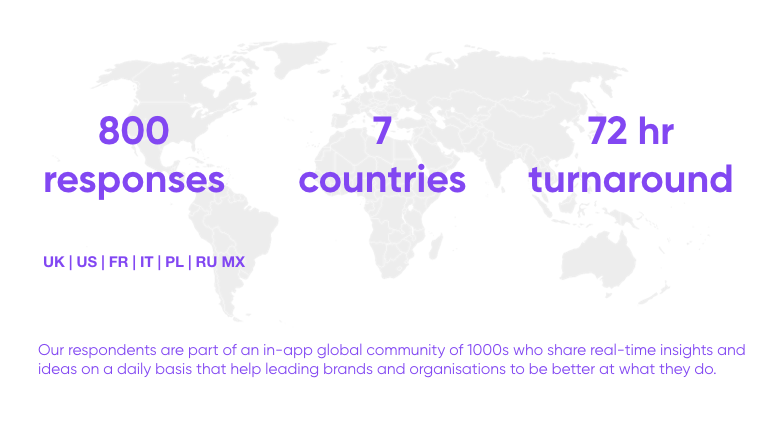
An overwhelming 88% of our Bulbsharers said they had experienced mental health issues. And when asked about the types of problems they’d faced, the most common experiences were ‘depression’ (with 45% of our respondents saying they had experienced it at one time during their lives), ‘sleep problems’ (43%) and ‘anxiety and panic attacks’ (36%).
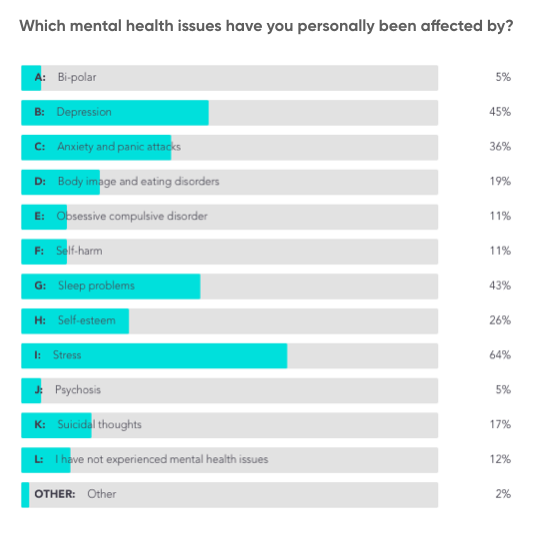
When asked to pick three main causes for a global rise in reports of poor mental health, 63% of respondents cited ‘personal finances’, 56% said ‘social media’ and 52% said ‘conflict with partners or friends’.
The workplace was also commonly mentioned, with 34% of our responses to open text box questions citing ‘work’ as an environment in which more needs to be done around the issue of mental health.
“… It should be mandatory for organisations to recognise the importance of mental health awareness.” (Bulbshare user)
“Companies should make it a norm to acknowledge that mental health is a real and important factor that affects productivity and figure out how they can help…” (Bulbshare user)


Once upon a time, only boring people drank no-alcohol beer. And if you were driving, you’d have a Coke. But with the emergence of a younger generation that increasingly shuns booze (a third of under 25s don’t drink according to 2015’s health survey for England), and a wider focus on health and wellness among adults, the no and low-alcohol trend is becoming harder to ignore. And as drinks brands and supermarkets respond, we are seeing a serious boom in the ‘no-low’ category.
Last month, we asked our Bulbsharers if they’d taken part in the ‘Go Sober for October’ campaign, and whether during that time, they’d been tempted by no or low-alcohol beer to fuel their abstinence. We had over 1000 responses from 8 different countries. This is what they told us…
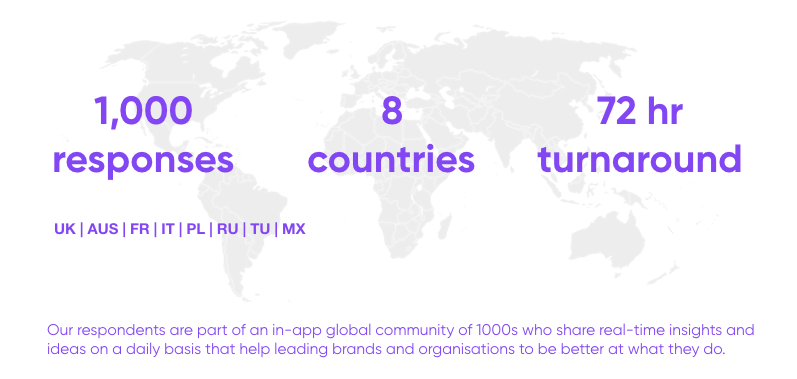
Socially acceptable
60% of our Bulbsharers who went sober for October said they drank no or low alcohol beer during that time. And when asked, would you continue to drink non-alcoholic beer after their sober month, 85% said they would.
Our Bulbsharers are just part of a trend that has seen more acceptance around alcohol-free drinking, a bigger appetite for no and low alcohol drinks and a significant growth in the ‘no low’ category. According to a BBC report, UK sales of low and alcohol-free beers jumped 28% in the year to February 2019, something that is replicated across Europe, while a 2018 survey from OnePoll tells us that 52% of Brits said drinking no alcohol beer has become more socially acceptable.
Changing attitudes
The key driver when it comes to this trend is overwhelmingly health. Almost 65% of our Bulbsharers cited health or health-related reasons as their main motivation for their month off booze, and in our anecdotal responses over 70% of answers mentioned either the negative effects of alcohol on physical and mental health, or the positive impact of abstaining.
Coupled with this, we are seeing a whole new climate of acceptance around ordering alcohol-free drinks in bars and pubs, and a change in attitude that’s breaking down the associations between ‘occasions’ and drinking. Our Bulbsharers told us they’d go ‘no low’ across a variety of occasions, from house parties and nights in to picnics in the park and festivals – and that alcohol-free options help them to keep a clear head but still feel ‘part of the atmosphere’.
New category
No low is officially booming. In response to these changing attitudes around alcohol, we are seeing a revolution in zero percent and ultra-low options – from super premium, super artisanal low-alcohol beers and stouts, to booze-free, botanical cocktails, wines and spirits that boast about added health benefits. And increasingly, bars, pubs and supermarkets are responding – with 2019 seeing the emergence of ‘no low aisles’ in supermarkets, as well as alcohol-free happy hours in bars.
Bulbsharers welcoming this trend tell us that no and low alcohol drinks taste just as good, or that – like the first time you taste beer or wine – it’s just a matter of getting used to it. Rather than trying to think they are drinking alcohol, our users enjoy the knowledge that they are not drinking booze and that they won’t suffer any of the associated effects, such as bloating, memory loss, ‘losing control’ or having a hangover. And the growing range of alcohol-free options available means for those wishing to not drink, any occasion is catered for.
Key quotes:
“Once I could not imagine meeting my friends without beer, lunch without wine or dinner without champagne…” (Bulbshare user)
“I like (zero alcohol beer) a lot because I feel like I am drinking a normal beer. I choose (it) because I want to be responsible in my consumption… My enjoyment is not being drunk but simply having a good time and enjoying a good drink…” (Bulbshare user)
“It tastes just as good without the alcohol…” (Bulbshare user)
“I actually wanted to feel I was (drinking) beer that wasn’t really alcoholic – drinking without getting drunk or bloated…” (Bulbshare user)
“They (zero alcohol beers) are delicious, they have many flavors and they are really refreshing. Thanks to these beers, at parties I don’t feel excluded…” (Bulbshare user)
“I like to drink more and more non-alcoholic beverages because we have plenty of choices nowadays compared to the last ten years…” (Bulbshare user)
“I still love my beer but simply can’t tolerate the alcohol any longer. The older I get the less I can handle it. (No alcohol) products are perfect for those of us who love beer but not the traditional problems that can come from it.” (Bulbshare user)
Key take-outs

Brands are pulling out all the stops to convince us that they stand for more than just profit. Increasingly, we are seeing ‘authentic stories’ around moral purpose – and tangible actions showing us that they are ‘committed to making a difference’.
In order to separate those that are getting real cut-through amid the white noise of moral messaging, we asked our Bulbsharers to tell us their favourite social purpose brands. Here’s 10 examples of brands that are doing ‘impact’ in surprising, innovative and authentic ways that have genuine resonance with the real-life, everyday consumers from our Bulbshare community.
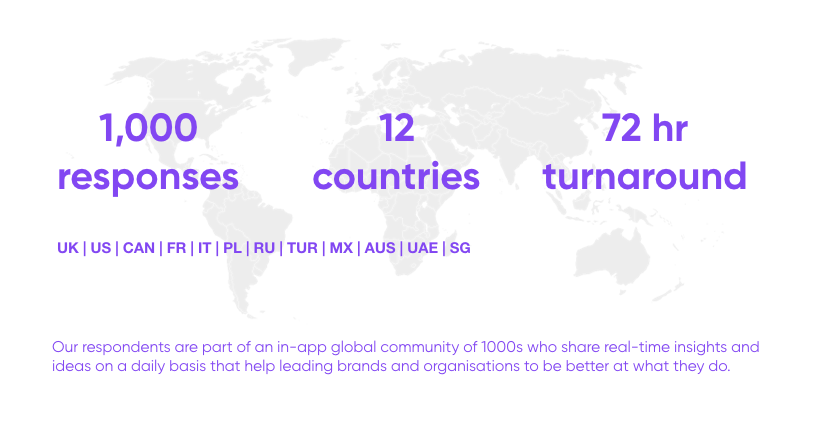
Sustainable products. Ethical, transparent processes. Social responsibility. Here’s our top ten brands loved by the Bulbshare community for their moral stance and actions.
It may be getting boring, but The Body Shop crops up time and time again with our users whenever the topic of impact comes up. From their much publicised work against animal testing to their sustainable, ethical stance on how they source their products, this is still the brand everyone wants to be friends with.
This is a brand that gains authenticity through real life action. Conscious Coffee puts its ethical stance right at the heart of its branding, sourcing their ingredients ethically and helping out disadvantaged communities in the process.
“The whole idea of ethical production has become the brand! Fantastic, right?” (Bulbshare user)
The Australian bamboo toilet paper company that is committed to changing lives, and does it with a smile. Using entirely recyclable materials and donating 50% of all their profits to provide toilets to those who don’t have them, this brand is founded on a mission to help those in need (while also making very nice toilet paper).
Leading the way in the tech industry when it comes to sustainability, Dell has already exceeded its 2020 goal of using £50m worth of sustainable materials in its products, and is now committed to a far reaching 2030 plan for advancing sustainability.
“Dell is setting an example for tech companies, who can contribute to (reducing) the massive toxic waste (caused by) non-decomposable plastics and components globally with their need to have buyers buy NEW every year, by addressing their environmental impact.” (Bulbshare user)
Obviously, we couldn’t really do this without giving Patagonia a mention. The Argentinian climbing brand featured heavily in our Bulbshare responses. From innovatively recycled products, sustainable materials and, seemingly, not really caring about profits (they once did an ad telling you NOT to buy their clothes if you didn’t really need them), these guys just keep getting everything right.
In 2018, Under Armour put all their sporty might behind their global ‘Unlike Any’ campaign which supported women in sport, celebrating female sporting achievements and shining a light on gender discrimination.
With their strapline, ‘together we’ll make chocolate 100% slave free,’ Tony’s is on a mission. This loveable chocolate brand is 100% committed to the cause and invites all their customers to get involved.
With its ‘Save money live better’ slogan, Walmart has become a philanthropic giant, committed to delivering value and providing affordable food to communities all over the world. With their impressive food bank donations, nutritional education and breakfast in the classroom programmes, they are wholly involved in numerous schemes to improve the lives of not just their customers but vulnerable people everywhere.
It may have been tarred with some negative press around tax avoidance in the last few years, but Starbucks is highly regarded by our Bulbsharers for its strong stance on moral purpose – being mentioned time and time again in our brief. The global coffee chain leads the way when it comes to sustainability, pushing the use of reusable cups, eliminating plastic straws and promoting sustainable farming processes. Their Grounds for your Garden initiative, that encourages the re-use of coffee grounds by giving them out free to customers to enrich their gardens, is just one of many schemes by the company to reduce the environmental impact of its stores.
“… For this and what Starbucks represents, I admire and adore this company.” (Bulbshare user)
The world’s second biggest sports brand is also pretty committed when it comes to purpose. Implementing environmental and labour policies to promote fair trade and sustainability, as well as founding and being part of non-profit initiatives that fight for worker equality and better standards of production, Adidas is way more woke than you might think. They don’t shout about it, but they’re doing all the right things.
“They (Adidas) are a member of the Sustainable Apparel Coalition, a global alliance of retailers, brands, suppliers, advocacy groups, labour unions and academics who fight for the sustainable production of textiles, apparel and footwear.” (Bulbshare user)
Key take-outs

It’s no secret that veganism is on the rise. With The Economist declaring 2019 as the year veganism went mainstream, and UK vegans increasing by 50% over the last decade (The Vegan Society), love them or loathe them, vegans are a growing force.
But do you have to be a vegan to be a vegan? The answer: not really. In a survey with 1,200 Bulbsharers, we found that more and more people are making vegan choices, while continuing to eat meat. What we’re seeing is a widespread introduction of mainly plant-based diets, with the occasional inclusion of meat. This dietary trend is known as ‘flexitarianism’, and it is increasingly being seen as the lifestyle choice of the future – not just for a healthy body, but for a healthy planet. So then, if 2019 was all about the V word, will 2020 be the year the F word goes viral?
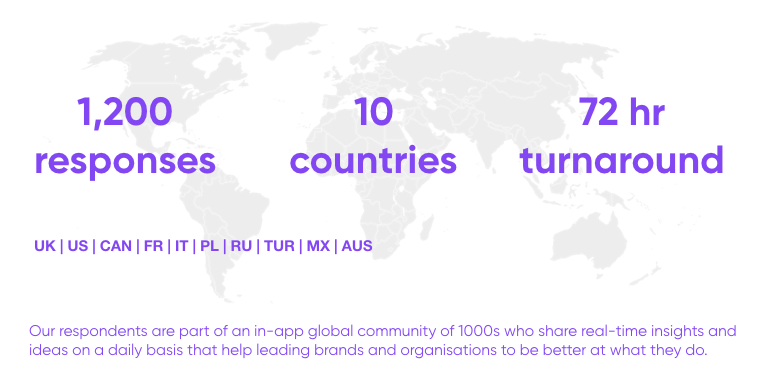
Our Bulbsharers aren’t cutting out meat and dairy all together but they’re making more informed choices about when and where they eat it. While 78% of our community say they still eat meat and dairy regularly, 66% of them have made an effort to decrease their consumption over the past two years – seeing meat as more of a ‘treat’ or ‘event’ and being more measured about when they eat it and, consequently, the type of meat they eat. The main enemies seem to be red meats, with beef and pork coming out top on our survey.
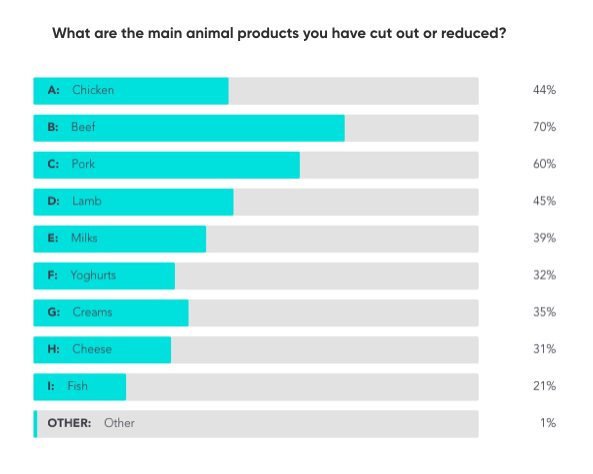
Overwhelmingly, the main driver here is health. 72% of our community cite it as one of their main reasons for cutting back, and it is mentioned in over 90% of our anecdotal responses. We see a high incidence of people talking about a reduction in animal products leading to having more energy and generally feeling better – and this is underpinned by a widespread suspicion around not truly knowing what meat products contain.
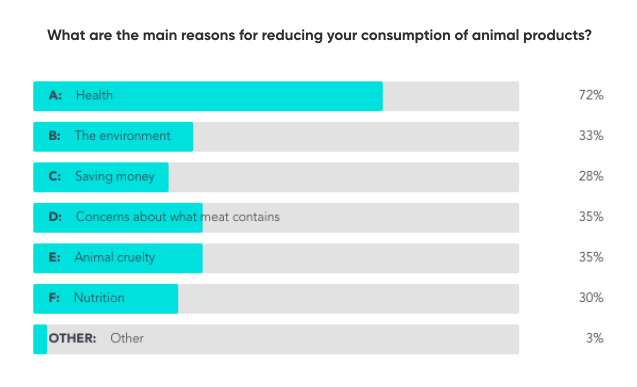
Our flexitarians say they are ‘happier and healthier’ with a reduced meat diet, report feeling ‘less tired’ and say they have ‘better complexions and better skin and nails.’ They tell us they have been influenced by ‘things they’ve read online’, magazine articles and Netflix documentaries about the meat industry – as well as rising media coverage about the benefits of a plant-based diet.
Increased vegan choices, though, has led to a strong sense of occasion around the times they do decide to have meat – and we see the emergence of an ‘event’ association around the eating of meat. Family is mentioned a lot by our Bulbsharers when asked about the times they consume meat, as well as eating out, restaurants and other occasions when they get together with friends.
With over 2,000 anecdotal responses in our survey, here’s what some of our Bulbsharers had to say around their flexitarian choices…
“Recently, meat (has) become an event for me and not an everyday food ritual.” (Bulbshare user)
“I (used to) have meat every day. Recently, I have taken steps such as having vegetarian/vegan lunches during the working week – so I’ve cut out meat from 5 meals.” (Bulbshare user)
“I’ve been reducing my intake of red meat. I have increased my intake of fruits, cereal flours and vegetable proteins and I don’t think I’ll go back as I don’t feel I need to.” (Bulbshare user)
“I tried to reduce my meat and dairy intake because of things I’ve read online and on social media. Now I try to consume more vegetables and grains and also plants containing protein.” (Bulbshare user)
Key take-outs

When it comes to recycling, our Bulbsharers are passionate and committed, but all too often they are left frustrated, annoyed and above all, let down by brands.
Our community wants to recycle, and usually does – but when they don’t, it is principally due to issues around packaging, such as unclear messaging and overly complicated rules. What we are seeing is a community that feels frustrated by brands and supermarkets – tellingly, 19% of Bulbsharers say it is ‘multi-national companies’ who are most responsible for our choices being sustainable (second on our list, behind ‘the individual’), but 21% say these companies are making the ‘least effort’ to help (again, second on our list). These people are crying out for a global brand to lead the way on recycling, with clear messaging around the issue, innovative packaging solutions, and a joined-up campaign that involves supermarkets and governments.
We asked 870 Bulbsharers users across seven different countries to talk about their issues and challenges when it comes to recycling. Here’s what they had to say…
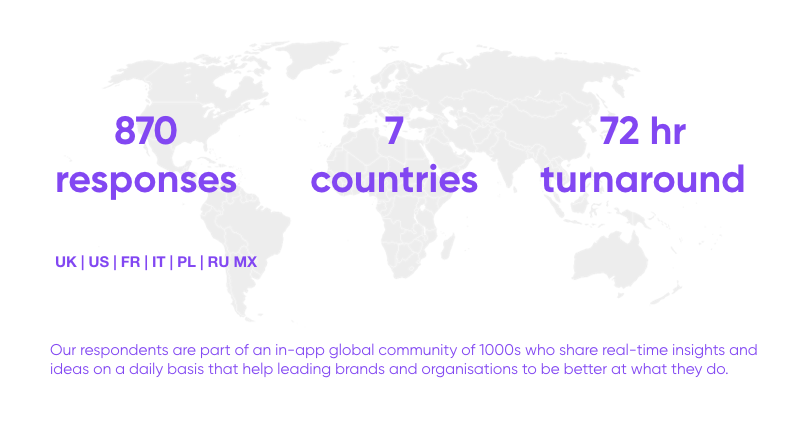
The main enemies seem to be supermarkets, global food brands and Governments. Our respondents feel like they are doing all the hard work – sorting, rinsing, deciphering complex numbering systems (plastics) – while being preached to by institutions who aren’t really helping.
Our community is trying to recycle as much as they can, and 64% of them said the way they shop for food and drink is one of the key areas where they are trying to make change. They want to shop more sustainably and feel brands can either hamper or drive this. They are looking for products with sustainable packaging and brands with strong, authentic stories that communicate tangible actions they are actually doing.
When asked who is most responsible for ensuring our choices are sustainable, 21% of Bulbsharers said ‘multinational companies’ – with this choice coming a clear second behind ‘the individual’. And when asked what is stopping them from being truly sustainable, 60% mentioned products or packaging.
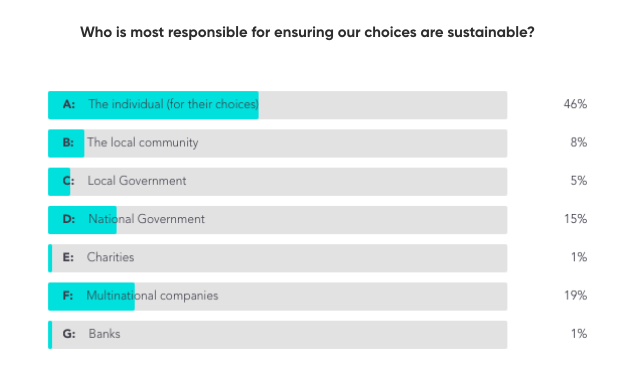
Have you heard of the number system for recycling plastic? Do you understand it? If you’re anything like the 870 Bulbshare users who answered our survey, it’s probably left you confused. The number is a “resin identification code, used to help recycling plants sort materials. Recyclable plastics are labelled with numbers 1-7 to tell workers what kind of plastic it is, and how it should be processed.”
The main plastics that are accepted for recycling are types 1 and 2 – which most ‘hard plastic’ containers fall into. But feedback from our users tell us that people are generally confused by the system, don’t know which plastics they can recycle and which they can’t, and end up lumping them all together. Did you know, for instance, that plastic bags are increasingly being accepted by recyclers and can be returned to many stores for recycling? Neither did most of our Bulbshare community.
“There’s so much confusion around plastic packaging – what can be recycled and what can’t. Often, it doesn’t tell you and you have to guess.” (Bulbshare user)
“What we need is a more awareness around the numbers system so people actually know how it works and what to do…” (Bulbshare user)
What emerges from our survey is a widely felt frustration at a lack of joined-up thinking between governments and supermarkets and brands (packagers) who have failed to come up with clear messaging, educational campaigns or easy-to-follow instructions on packaging. When asked who is making the least effort to be sustainable, ‘multi-national companies’ came second on our list of options, behind ‘the individual’.
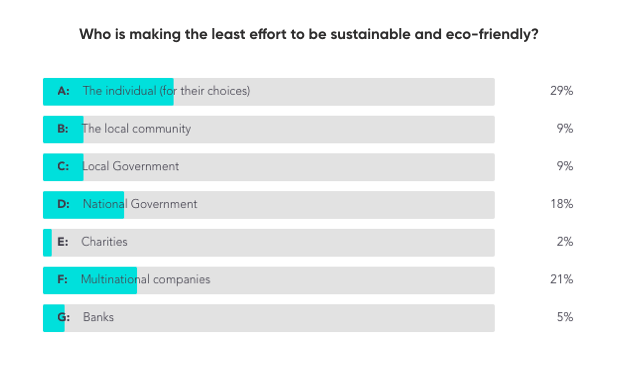
Our community wants recycling – especially plastic – to be simplified, with supermarkets and big FMCG brands leading the way…
“Companies can use all the plastic they want then put it on (us) to recycle. And there’s no clear messaging. It’s very confusing.” (Bulbshare user)
Our community cites challenger brands like Grove who have an eco-friendly refilling programme for their cleaning products and Reel who make tree-free bamboo toilet paper and donate reusable toilets to African communities for every roll they sell.
They also tell us about cosmetics brands such as Lush and The Body Shop who are innovating around sustainability, and clothing manufacturers like H&M, Zara and Patagonia who are leading the way with recycled materials and garment recycling programmes. These brands are clear with their messaging, have simple, sustainable processes and communicate them well. When it comes to their strategy and messaging around recycling, our Bulbsharers tell us that big brands could learn a lot from how the smaller brands are doing things.
Just as major global FMCG giants must learn from these smaller ‘green’ brands, supermarkets need to look to the multitude of independent refill and re-use food shops that are increasingly popping up in local communities. While these zero-waste shops began as a comparatively esoteric ‘movement’, used only by sustainability extremists, they are increasingly moving into the mainstream consciousness and mentioned more and more by our Bulbshare community.
The overriding message from our community is that the recycling process needs to be simplified and that brands, supermarkets and governments must lead the way – with joined up thinking leading to clearer messaging, raised awareness and a better process.
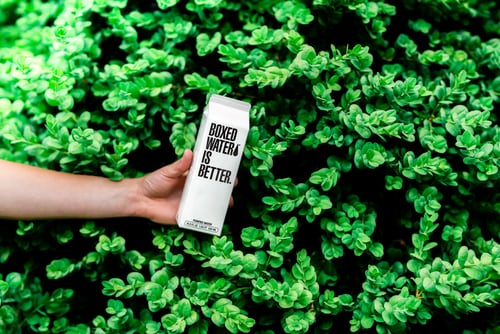
When it comes to sustainability, our Bulbshare community REALLY cares – and they’re going beyond just recycling to make a difference. 90% of our respondents answered emphatically when asked if living sustainably has become part of their everyday life.* And we’re not just talking cutting down on plastic – these people are ‘taking shorter showers’, only buying second-hand clothes, using natural cosmetics and bamboo toothbrushes, and following online blogs that educate them about how to live sustainably. They are making individual choices, but they are also putting their trust in brands that they see as committed to the cause.
64% of our community said the way they shop for food and drink is one of the key areas where they are trying to make change. They want to shop more sustainably and feel brands can either hamper or drive this. They are looking for products with sustainable packaging and brands with strong, authentic stories that communicate tangible actions they are actually doing.
When asked who is most responsible for ensuring our choices are sustainable, 28% of our community said ‘multinational companies’. And when asked what is stopping them from being truly sustainable, two words loomed large in a word cloud of responses: ‘products’ and ‘packaging’.
Modern consumers are seriously committed to sustainable living, and they expect the brands they use to be the same. They want brands to lead the way and find innovative solutions to change how they package their products…
“Brands should engage with their consumers, ask if they’d be willing to pay more for sustainable packaging. I think people would be willing to pay more for packaging they could use again and again. The public conscience is shifting towards this now…” (Bulbshare user)

Our community is savvy, and they’re sceptical of brands that cash in on sustainability buzzwords, without taking any real action. They want brands to mean it. And it’s not just about packaging. Our community say they want brands to be transparent about their manufacturing processes, from the electricity they use to how they treat their workers.
“I don’t want brands to just be jumping on the bandwagon. I want to think they believe in what they are saying and are properly committed. They should be always improving and looking for new ways of being sustainable that aren’t just about profit.” (Bulbshare user).
The message is clear. Our community wants to live and shop sustainably, but they can’t do it without brands leading the way. They expect change, and the brands that demonstrate commitment and action, are the ones that will gain market share.
* These respondents chose ‘somewhat’ or ‘very much’ from a list of options.